#(lots of Star Trek books could very reasonably be considered fan-fiction)
Note
📷 What’s set as your phone’s lockscreen?
✏️ Have you ever written fanfiction?
🐰 What do you think says the most about a person?
📷 What’s set as your phone’s lockscreen?
It's just the default - I've never changed it. 🤷♂️
✏️ Have you ever written fanfiction?
I have not, actually.
🐰 What do you think says the most about a person?
These days, in most countries, probably their politics. There are some pretty obvious dividing lines where who a person supports speaks clearly to what they think of large numbers of their fellow humans.
#there might be a few places left where that's not the case#but it seems to be pretty worldwide at this point#highly unpopular opinion for this website but...#I don't even *read* fan-fiction 😅#(well... non-professional fan-fiction anyway)#(lots of Star Trek books could very reasonably be considered fan-fiction)#(some by people present on this platform)#and yeah I just don't really care about my phone#so aside from trying to delete every pre-loaded piece of bloatware that I can#I don't bother with it#never changed anything on the last one#(which I had for 8+ years)#haven't changed anything on this one#I will say the old one's lockscreen was more interesting#this one is just a hemisphere of a blue orb#pretty boring#thank you for the questions! 😊#asks
0 notes
Text
I review killing time (or whatever)
Okay, yes this review has taken me forever and that’s because there’s so much I want to say, and most of it has very little to do with the plot of the book. I cut down a lot of this so you guys could just get to the main point of what I’m trying to say, so I apologize if this is a little brief or incomprehensible to those who haven’t read the book.
And also, before I get into it, I would like to say rest in peace to the author Della Van Hise, who passed away in march of this year. She contributed a lot to the fandom, especially in regards to K/S fiction, as well as publishing a lot of non-trek related work during her life.
First of all, if you have heard of Killing Time, there is probably one specific reason for that. It’s the same reason I picked up the book in the first place and why it’s really even a topic of discussion on this site. To put the story quite briefly, Killing Time was recalled during its initial release on account of the book having too many slash elements (aka, the relationship between Kirk and Spock could be read as sexual/romantic). I first heard about the book here in this post where the history of it is worded to sound like one very dramatic mystery. One user (no shade intended here) even goes as far as to say the book was recalled by old Gene himself! Now I’m always one for drama and such, but after reading the book I looked into it a little more, and I don’t think that’s exactly how it went down.
Here you can find multiple statements from the author herself, in which she tells the whole story. According to her, the book publisher accidentally released an unedited manuscript that was never supposed to make it to the public. So technically the publisher did not recall the book because it was “too gay”, they recalled it because they printed a version that was never meant for the public to see anyway. These were the edits that were specifically requested by Paramount, who the publishers were supposed to go through to get the final okay on all material. And like, yeah, all of Paramounts edits were pretty much to delete any sentence where Spock and Kirk are tender to each other, they were trying to make is less homoerotic, obviously. I understand why this slight distinction may not make much of a difference to you guys, but for me it’s important to note that the book wasn’t recalled because it was too gay, it was just never supposed to be gay in the first place. It doesn’t make that fact any better, but it does make it less dramatic, in my opinion. I encourage you to read the statements from the author on this topic though, because she gives the whole story a lot better then I just did.
Now to address the main question at hand, does Killing Time depict a romantic relationship between Kirk and Spock, or is it all just hype? (in layman's terms, is the book gay or not?) and to answer quite plainly, yes it’s gay. of course it is. but then to answer less plainly, no. What the fuck do i mean by this? well let me try and explain.
I read the second edition of the book, aka the censored version, but I also followed along with the first edition (using this great article). The changes made to the book did not effect the plot at all, and were really only minor things. Notably, in the second edition they just kind of left out any part where Spock and Kirk touch each other (and I don’t mean in a sexual way). For example, there is a scene where Spock and Kirk are having a serious conversation in the ships garden. In the first edition, at the end of the conversation Spock places a hand on Kirks shoulder, which Kirk covers with his own hand. In the second addition, all mentions of this simple contact are deleted. The differences between the two are mostly little things like this. There is no secret sex scene or love confession hidden in the first addition. You see, in my opinion, the changes made to the second edition of the book do very little to censor the romantic undertones between Kirk and Spock. That’s because they are ingrained in the plot line itself.
One very important aspect to this book is that Kirk and Spock share a mental bond. This is something that can only happen between a Vulcan and another when they are extremely close. The mental bond that Kirk and Spock share is so strong in this book, it’s even present when they enter an alternate dimension where they are strangers to one another. There is a romance in this book between two original characters, and their relationship is constantly being paralleled by that of Kirk and Spock. And, maybe most telling, Spock refuses a female Romulan who is very interested in him over and over again simply because Kirk exists. And no, that’s not an exaggeration, here is a line from when the Romulan woman was begging Spock to be in a relationship with her:
“I need you. The Empire needs you, what more can there be?”
“James Kirk” the Vulcan murmured without hesitation.
That line is in both versions of the book. What I’m trying to say is yes, there are K/S elements in Killing Time. There are many tender moments and lots of talk about Kirk and Spock’s devotion to each other.
So now you’re asking yourself, Gar, why did you just say earlier that “no, the book is not gay”? Well, that’s because it’s not. This isn’t a K/S book. This isn’t a piece of Spirk fanfiction. Because for as much as this book is about Kirk and Spock’s relationship, it’s even more about Romulans (and more specifically, that one girlboss Romulan Commander from the Enterprise Incident.... bet ya didn't see that coming!) That’s right, the most controversial Star Trek book ever published is at it’s core quite plainly just a Star Trek book. There is weird alternate dimensions, time travel, espionage and lots and lots of Romulans!
Alright, alright, what I’m really trying to get at here is that yes, if you read into Killing Time there is K/S elements. I mean for god sake the author was a known K/S fanfic writer, that wasn’t a secret by any means. If she wrote their relationship a little more tenderly than most authors would have, can we really be surprised? But writing a K/S story was not her intention here, and that’s not what this is. I think the author put it best herself, so I’m just going to put that here:
“If people chose to see overtones of K/S in it, maybe it’s because there were overtones of K/S throughout Star Trek itself.”
People will hype up killing time as some secret confirmation that K/S is real and canon, and I really get that. Like, it would be really nice to have some canon acknowledgment of K/S, and I really don’t blame people for acting like that’s what this is. But that really isn’t what this is. And even if there was some kind of love confession, I really hate to break it to you, but the Star Trek novels are just fancy fanfiction and are not considered canon by any stretch (excluding the one Gene wrote himself, which let’s face it, perhaps has the most K/S elements of all).
If you are looking for a nice story about Kirk and Spock being in love, then I very much urge you to look at Ao3 or similar sites. Skip this, if you want a K/S story, because that’s not what this is. Now, if you’re a huge fan of the Romulan commander from the Enterprise Incident, then my GOD you have to read this. I think this was a pretty solid Trek book. It was no piece of literary genius, but it got the job done. There was a lot of it that I think could have been left out, because it the later half it started to drag horribly, and we got a few plot threads that went absolutely nowhere. I’m not sure I’m much of a fan of alternate universes, as I really really enjoy the established dynamic of the characters, but it didn’t bother me too much. But I mean hey man, there was defiantly parts where I was so invested I couldn’t put the book down. Give this one a read if you’re looking for a pretty interesting Trek book with a little bit of cheeky K/S sprinkled here and there.
If you have given the book a read, or just have thoughts in general, I’d love to hear them!
#here it is people#as always sorry for any grammer or spelling mistakes#i know there are prone to be some so just uhhhhh#ignore it if you can#star trek#killing time#kirk#james t kirk#spock#kirk/spock#k/s#spirk#the original series
124 notes
·
View notes
Text
One Redditor’s interpretation of why we all love Daneel so much
https://www.reddit.com/r/asimov/comments/2wxxy0/why_does_everyone_like_r_daneel_so_much/covfdxm/?utm_source=share&utm_medium=ios_app&utm_name=iossmf&context=3
Sooo... wall of text incoming.
I'll start by saying that the answers such as "you have to read the later books" miss completely the point. R. Daneel Olivaw was well beloved before the later books - as a matter of fact, Asimov included R. Daneel in the Foundation books because the public wanted to see more of him: R. Daneel needed only two books and a short story to be remembered forever. His fame would be increased and affirmed with the later books, but what made him so famous and beloved in the first place?
Let's admit it, the popularity of a character is sometimes a mysterious thing. Why was Star Wars' Boba Fett such a fan favorite? I have no idea since I have no liking for his character. Sometimes a character resonates with the audience because he just does - and maybe Daneel just did. But let's try to see if we can find a reason for Daneel's prevalence.
I will here argue that R. Daneel Olivaw used to be a very unique character 50 years ago, when the first two Robot mysteries were written (1954 and 1957): he was nothing short of groundbreaking, despite the sketchy characterization (not Asimov's forte, as you correctly say).
Elijah Baley himself, you see, is a good character (I'd even say he's an unusually well-sketched character for Asimov), but he's nothing new. He's your usual hardened and capable detective, self-doubting and claustrophobic (in more senses than your usual one): a good character, as I said, but very much the usual fare. Literature, already back then, was packed with the same sort of no-nonsense, slightly flawed but genial police detectives. Gladia is a good character, but the accused but desirable widow or the exotic apparently-out-of-your-league damsel in distress are old tropes (she surpasses this roles only in her 1985 appearence). Han Fastolfe is a character I'm surprisingly fond of, but once again, conventional in his ways (the mix of the dedicated and genial scientist and of the consumed politician).
On the other hand Asimov himself, in one essay, recounts how very few Robots had been portrayed as "good" (most were evil, or flawed, or incompetent, or defective, or rebellious, or a combination thereof) - think of Metropolis' Maria, of Clarke's Hal2000 computer, of the silent and deadly warden of The Day the Earth Stood Still, and so on. In the most benign portrayal of robots back then, they were helpful - but somewhat stupid and possibly humorous - servants (see, much later, Star Wars' C3PO and R2D2). Of all of Asimov's robots, R. Daneel Olivaw is the one that first subverts most of these tropes. He is unmitigatedly "legal good" - a true paladin of the Three Laws. He is strong and independent and confident and clever and unyieldingly loyal. Most of the psychological tension in Caves of Steel comes from Elijah Baley actually worrying that a robot like Daneel could take his place. Obviously, Elijah always solves the case which suggests that, despite his being apparently a superhuman Daneel still lacks "the spark" (intuition? humanity? geniality?) to equal Elijah - and this, finally, makes Daneel imperfect, and thus acceptable and improvable (you can see Daneel learning from Elijah).
We, the reader who read a book written from the point of view of the human Elijah Baley, can see him going from mistrust and envy to respect and appreciation. We can see how the human Elijah Baley starts considering Daneel worthy of his affection - a friend, that is.
Daneel is not only the first robot detective (to the best of my knowledge) to be ever created, but also one of the first robots to be portrayed as an equal to a human being and deserving to be a friend: in one word, groundbreaking. Today he feels less interesting because he opened the way to lots of similar robots: but, say, Star Trek's Data or Aliens' Bishop owe everything to Daneel Olivaw (without implying any explicit causal connection between them).
To me, for what he represented, for what he is in relation to Elijah Baley, for what he shows us about the potential of robots (and, in a way, of humanity), for being the first and opening the way, R. Daneel Olivaw is one of the best, and most meaningful, characters to have ever existed in science fiction.
31 notes
·
View notes
Text
Disinterpretation
I finally finished the Sarah Z video about “pro vs. anti”. It’s pretty long, and I ended up watching it in chunks over several days, but I think it’s worth watching, especially if you’re sort of partially connected to online fandom, but not enough to be aware of all the lingo.
As I expected, the whole thing was vague and confusing because the people involved in the conflict made it vague and confusing. In theory, the full terms would be “pro-shipping” and “anti-shipping”, but it seems like it’s more about particular kinds of ships that could be considered controversial. But that’s a slippery slope, and apparently the whole conflict mutated into both sides deciding that every hypothetical relationship between fictional characters is either equally valid or equally dangerous.
Long story short, it’s just purity culture, which was what everyone on Tumblr was calling it around 2012. But now, if you’re a sane person who genuinely asks: “Who gives a fuck about Voltron?”, these people will jump your ass and accuse you of being on the side of their enemies. “Children have died over the importance of Lotor/Hagger! Your callous indifference proves that you yourself must have murdered children!”
I think what Sarah Z really hit upon in this video was that media consumption has become so ingrained in our culture that people feel like it has to go hand-in-hand with our morality. That is, it’s not enough for me to watch Star Trek, I have to justify Star Trek as evidence that I’m a good person. Maybe this is where the expression “guilty pleasure” comes from. Conversely, it’s not enough for me to not watch Dr. Who, I have to somehow convince everyone that Dr. Who was invented by the devil.

I’m pretty sure the Reylo ship has a lot to do with this, since it’s kind of understood to be a dark, problematic concept, and fans either embrace its flaws or recoil in horror because of them. Star Wars itself is a dumb story about space wizards, so people try to give the debate more weight by linking it to freedom of self expression and/or enabling real world harm. Suddenly it’s not enough to just think two actors would look cute making out instead of fighting. Now it’s this battlefield for the soul of civilization or something.

I grew up in the 80′s, when “concerned parents” and grifters would accuse the Smurfs and metal bands of promoting satanism and witchcraft. I used to hear stories of teens going out into the woods in the middle of the night to do occult stuff, and all I could ever think about was: “Why would anyone bother wandering out in the woods in the middle of the night?” Which is why “concerned parents” turned their attention to things that were closer to home, like Saturday morning cartoons. It had nothing to do with the content; it was just about finding a safe, accessible target for their hysteria. Some people want to go on a crusade without leaving the house, so they pick a fight with Papa Smurf instead of confronting the real evils in the world. Even as a kid, I knew this was a con, because I’d watched the show for myself and knew it was too saccharine to be threat to anyone.
The pro/anti folks have tried to disguise this with a lot of terminology. I wondered why they seemed to reluctant to use the full terms “pro-shipper” and “anti-shipper”, and it’s probably a couple of things. First, the word “shipper” is basically an admission that this is pointless bullshit that doesn’t matter, and they’d like to avoid that connotation. Second, they seem to have decided that this goes beyond shipping itself, into practically anything else they want it to involve. It’s all part of the con, which is to make you believe that it’s “us vs. them”, and you can be part of “us” by curating specific attitudes about Steven Universe.
Seriously, “about Steven Universe” is such an incredible punchline. You can make anything funnier by adding those three words to the end of a sentence. “Do not interact if you blog about Steven Universe.” “Hey, what’s up, YouTube, this is SSJ3RyokoLover69, and this is going to be kind of a serious video about Steven Universe.” “Mrs. Johnson, the results of your biopsy are in, and I have some bad news about Steven Universe.” It’s a fucking kids show. “Oh no, all the characters look like the characters in all the other kids shows!” Yeah, that’s because it’s a kids show. Marvin looks like Garfield, this isn’t new.
The common denominator here seems to be that both sides try to wrap themselves in the flag of vulnerable groups: impressionable minors, trauma survivors, harassment victims, etc. The “pros” want to protect those people so that they can feel free to explore weird subject matter on their own terms, and the “antis” want to protect the same people from being exposed to weird subject matter that they might not want to see. It’s all about establishing a moral high ground. Back in the day, it was called “sanctimony”.
But people get roped into this, because at their core, people want approval, and this stupid conflict offers them a sense of community. As long as you support the cause, whatever it may be, you’ll have this online friend network that appears to support anything you do. But if you deviate from their norm, you’ll be cast out. Does this sound familiar?

To use a more familiar example, I still sometimes find people clamoring about Gochi vs. Vegebul. I’ve never understood this, because both ships were canon, and I never saw much direct evidence of a war between them, but people would still talk about how crazy the Vegebul shippers were, and how crazy the Gochi shippers were, and it was like some huge thing going on just over the hills. It’s the same idea, since the idea that you could like both or neither never seems to occur to anyone involved. I never gave a shit, because I used to see the same dumb agendas in the Harry Potter fandom.
Okay, so let me take you back. It’s 2005 through 2011, and I’m hateblogging all seven Harry Potter novels, because fuck you, that’s why. The funny thing I encountered was that occasionally fans seemed to want to pretend like my bashing of certain characters was proving them right somehow. They were like “See? He hates Ron Weasley too! That proves that Seamus Finnegan is the coolest guy ever.” The Slytherin stans would do this all the time, because I would constantly take the piss out of the Gryffindor characters for being self-important dopes. I think they just liked hearing it from an outside perspective. But I had to keep reminding them all that I hated all of them. Every character from Harry Potter sucks ass. Voldemort was my favorite, but only because he was the one guy who wanted to kill all of the others. But he sucks too because he failed.
And the shippers were the same way. I’d say something shitty about Ron, because Ron sucks, and some smartass Joss Whedon fan would be like “Yes! Boost the signal! That is why Harry/Hermione is the best ship!” And I’d be like “No, Harry and Hermione suck at least as bad as Ron does. They’re all terrible and I hate them.” I really do think there was some sort of Stockholm Syndrome going on with Harry Potter books, where everyone secretly knows they suck, but the fans sort of latch on to one or two characters and go like “Well, he’s not as shitty as the rest.” Like finding spaghetti in the trash and picking out the meatball with the least amount of lint on it. Then you’d go and start a flamewar with some other starving person over whether your meatball is shittier than theirs. This is what people mean when they say to read another book.
Anyway, the big thing I picked up from Sarah Z’s video is “disinterpretation”, a term coined by MSNBC columnis Zeeshan Aleem. The Twitter thread is worth a read, but the short version is that he once remarked that a Julia Louis-Dreyfus routine wasn’t very good, and someone got mad at him for insinuating that women are incapable of being funny. They just took his dissatisfaction with one performance by one comedian as being a universal condemnation of women comedians in general. And this sort of thing is all over the internet. Everyone sees what they want to see and then they take it as permission to overreact.
I ran into this myself a while back, because someone saw who I interacted with on Twitter and decided that they’re all bad guys and if I have any interaction with them, then that makes me a bad guy too. At the time I tried to play it cool, but the more I think about it, the more it ticks me off. And over the course of that conversation, it was said that I don’t talk about myself much, and that’s kind of funny, because all I ever do on social media is write long-ass blog posts like this one. I don’t expect anyone to memorize them, or even read them all the way through, but when I write all this stuff and someone goes out of their way to say they don’t know anything about me, the message is that they just didn’t pay attention to what I was saying, and they didn’t bother to try.
So I’m a little jaded from that, because I got called out for a bunch of stuff I didn’t even do or say, and apparently that’s just a thing that happens. People will reject you for completely arbitrary reasons, not because of anything you actually said or did, and you’re left thinking you made some terrible mistake. Except, no, I’ve seen it happen to other people, people a lore more conscientious than I am, and if they can’t satisfy the bullshit purity standards, then I never stood a chance. If the game is rigged so I can’t win, then I’m not going to play.
And it’s that same condition that probably draws people into these online holy wars, because if you declare yourself for the pro or anti side, at least then you’ll have a posse backing you up. Only they don’t support you, they support your willingness to support them. Once your commitment to their agenda wavers, even in the slightest, they will turn against you.
Sarah Z suggests that both sides of the war drop the pro and anti terms, since they lost all meaning long ago. But that just invites a new set of useless terms to perpetuate the same cycle. Her more useful advice is for fandom people to broaden their horizons. She got a lot of flak for tweeting “Go outside” once, but the ironic thing is that it’s sound advice. I had lunch with my mom yesterday and it was just nice getting away from things for a while. People need to do that more often, and unfortunately it feels like it’s harder to do than ever before.
But “go outside” isn’t just a literal thing. It can mean going beyond your usual haunts, reading the same books, watching the same shows, rehashing the same conversations. I think the reason this stuff always revolves around “shipping” is because there seems to be this deep-seated compulsion to pair fictional characters off like this, and for a lot of folks it’s the only way they can consume a story, so they do. And they do it lot, and there’s a lot of them, and they do it the same way every time, and lo and behold the same old conflicts start up. So maybe “go outside” should mean “go outside of that cycle once in a while.” Just a thought.
9 notes
·
View notes
Note
ngl asking for people who self-identify as "antis" is already biasing your results because the term originated from fans being defensive over getting called out (eg the types who sincerely think fandom culture is ""puritan""). fair number of people started to use the term ironically and it might be evening out but overall the post calling for responses on the survey still comes off as something written in bad faith?
I wrote a rather long and involved response and then tumblr ate it. Goshdarn.
Fair warning, this is a hyperfixation and I’m coming off of a migraine so this may not be very cogent. Please read this in the over excited tones of someone infodumping about emulsifiers, with no animosity intended.
So, tl;dr and with a lot fewer links, I’m incredibly interested by your perspective that “anti” originated as a derogatory term.
As far as I am aware, the etymological history of the word “anti” being used pejoratively is coming from some very new debates.
I’m also noting that you had no feedback regarding the content of the questions themselves, which I would be interested in hearing as I am genuinely coming from a place without censure.
The term “anti” actually is a self-descriptor that arose in the Livejournal days, where you’d tag something as “Anti ___” for other like minded people to find. (For example, my cursory google search pulled up 10 Anti Amy Lee communities on LJ).
I’m a self-confessed old. I was back in fandom before Livejournal, aaaall the way back in the Angelfire days. Webrings children! We had webrings! And guest books for you to sign!
I’m going to take a swing for the fences here Anon, so if I’m wrong please let me know, but I’m going to guess you became active as a fan in the past 5-8 years based of your use of the term puritan.
There’s actually a HUGELY new debate in fandom spaces! Previously, it was assumed that:
a) All fandom spaces are created and used by adults only.
b) If you were seeing something, it’s because you dug for it.
These assumptions were predicated upon what spaces fandoms grew in. First you had Star Trek TOS fandom, which grew in 1970s housewives kitchens. They were all friends irl, and everyone was an adult, and you actively had to reach out to other adults to talk about things. (By the way- a woman lost custody of her children in the divorce when her ex husband brought up to the judge she kept a Kirk/Spock zine under her bed. The judge ruled this as obvious signs of moral deficiency. That was in the 80s! Everyone is still alive and the parents are younger than my coworkers!)
Time: 1967-1980s. Is Anti a term? No. Who is the term used by? N/A Is fandom space considered Puritanical? No.
Then, when the internet came about, it was almost exclusively used by adults until The Eternal September. 1993 was the year that changed the internet for good, but even years after that the internet was a majority adult space. Most kids and teens didn’t have unlimited access if their parents even had a home computer in the 90s.
This is the rise of Angelfire, which were fansites all connected to each other in “rings”. You had to hunt for content. If you found something you didn’t like, well, you clicked out and went on with your day because you’d never see it again unless you really dug. This was truly the wild west, tagging did not exist and you could go from fluff to vore in the blink of an eye with nothing warning you before hand. All fannish spaces were marked “here be dragons” and attempts were made to at least adopt the “R/NC-17″ ratings on works to some limited success, depending on webmaster.
Time: 1990-1999. Is Anti a term? No. Who is the term used by? N/A Is fandom space considered Puritanical? No.
In 1999 LiveJournal arose like a leviathan, and here is where the term Anti emerges as a self descriptor. Larger communities began to form, and with them, divisions. Now, you could reach so many fans you could reach a critical mass of them for enough of them to dislike a ship. The phrase “Anti” became a self-used tag, as people tagged their works, communities, and blogs with “anti” (NB: this is at far, far smaller rates than today). Anti was first and foremost a tagging tool used and created by the people who were vehemently against something.
You could find content more easily than in the past, but you still had to put some serious elbow grease into it.
In 2007, Livejournal bans users for art "depicting minors in explicit sexual situations”. The Livejournal community explodes in anger- towards Livejournal staff. The account holders/fans view this as corporate puritanical meddling. The outrage continues as it is revealed these bans were part of a pre-sale operation to SUP Services. SUP Services, upon taking over Livejournal in 2008, proceeds to filter the topics “bisexuality, depression, faeries, girls, boys, and fanfiction”.
The Great LiveJournal Migration begins, as fans leave the site in droves.
Time: 1999-2009. Is Anti a term? Yes. Who is the term used by? People self describing, seeking to create communities based off a dislike of something. Is fandom space considered Puritanical? No.
Where do fans go? Well, in the last decade, they migrated to Tumblr and Twitter (sorry Pillowfort- you gave it a good try!)
What’s different about all of these sites? Individuals are able to create and access content streams. These are hugely impactful in how communities are formed! Because now:
a) finding content is easier
b) finding content you dislike by accident is easier
c) content you dislike requires active curation to avoid
d) truly anonymous outreach is possible and easy (for example, you anon! Isn’t it much easier to go on anon to bring up awkward or sensitive topics? I’m happy you did by the way, and that’s why I keep my anons open. It’s an important contextual tool in the online communications world!)
Now the term Anti gets sprightly. Previously, if you didn’t like content, there was nothing you could really do about it. For example, I, at the tender age of way-too-young, opened up a page of my favorite Star Trek Deep Space 9 fansite and pixel by pixel with all the loading speed of a stoned turtle a very anatomically incorrect orgy appeared.
I backed out.
1. Who could I contact? There was no “message me here” button, no way to summon any mods on Angelfire sites.
2. If I did manage to find a contact button, I would have had to admit I went onto a site that wasn’t designed to keep me safe. I knew this was a site for adults, I knew there wasn’t a way to stop it from showing something. There was no such thing as tags. I knew all of this before going in. So the assumption was, it was on me for looking. (Some may have argued it was on my parents for not supervising me- all I can say is thank GOD no one else was in the living room and my mom was around the corner in the kitchen.)
But now? On Tumblr? On Twitter? In a decade in which tagging is so easy and ubiquitous it’s expected?
Now people who describe themselves as antis start to have actual tools and social conventions to utilize.
Which leads to immediate backlash! Content creators are confused and upset- fandom spaces have been the wild west for decades, and there’s still no sherriff in town. So the immediate go-to argument is that these people who are messaging them are “puritans”.
And that’s actually an interesting argument! A huge factor in shaping the internet’s social mores in the latest decades is cleanliness for stockbrokers. Websites can become toxic to investors and to sales if they contain sexual content. Over time, corporations perfected a mechanism for “cleaning” a site for sale.
Please note there is no personal opinion or judgement in this next list, it is simply a description of corporate strategies you can read during the minute meetings of shareholders for Tumblr, Twitter, Paypal, Venmo, Facebook, Myspace, Yahoo Answers, and Livejournal.
1. Remove sex workers. Ban any sex work of any kind, deplatform, keep any money you may have been holding.
2. Remove pedophilia. This is where the jump begins between content depicting real people vs content depicting fictional characters begins.
3. Remove all sexual image content, including artwork of fictional characters.
4. Remove all sexual content, including written works. If needed, loop back to step 2 as a justification, and claim you do not have the moderators to prevent written works depicting children.
I would like to reiterate these are actual gameplans, so much so that they’ve made their way into business textbooks. (Or at least they did for my Modern Marketing & App Design classes back in the early 2010s. Venmo, of course, wasn’t mentioned, but I did read the shareholder’s speeches when they banned sex workers from the platform so I added them in the list above because it seems they’re following the same pattern.)
So you have two groups who are actively seeking to remove NSFW content from the site.
A) Corporate shareholders
B) People are upset they’re seeing NSFW content they didn’t seek out and squicks them
Now, why does this matter for the debates using the term “puritan” as an insult?
Because the reasons corporate shareholders hate NSFW material is founded in American puritanism. It’s a really interesting conflation of private sector values! And if Wall Street were in another cultural context, it would be a completely different discussion which I find fascinating!
But here’s the rub- that second group? They're not doing this for money. If there are any puritanical drives, it’s personal, not a widespread cohesive ideology driving them. HOWEVER! The section of that group that spent the early 2010s on tumblr did pick up some of the same rhetoric as puritanical talking points (which is an entirely separate discussion involving radfems, 4chan raids, fourth wave feminism, and a huge very nuanced set of influences I would love to talk about at a later time!)
These are largely fans who have “grown up” in the modern sites- no matter how old they actually are, their fandom habits and expectations have been shaped by the algorithms of these modern sites.
Now HERE‘s the fascinating bit that’s new to me! This is the interpretation of the data I’m getting, and so I’m out on a limb but I think this is a valid premise!
The major conflict in fandom at this time is a struggle over personal space online.
Content creators are getting messages telling them to stop, degrading them, following them from platform to platform.
They say “Hey! What gives- we were here first. The cardinal rule of fandom is don’t like, don’t read. Fandom space has always been understood to be adult- it’s been this way for decades! To find our content, you had to come to us! This is our space! This is my space, this is my blog! If you don’t like it, you’re not obligated to look!”
Meanwhile, at the exact same time, antis are saying “Hey! What gives- this content is appearing on my screen! That’s my space! I didn’t agree to this, I don’t like this! I want it to be as far away from me as possible! I will actively drive it away.”
This is a major cultural shift! This is a huge change and a huge source of friction! And I directly credit it to the concept of “content stream” and algorithms driving similar-content to users despite them not wanting it!
Curating your online space used to be much simpler, because there wasn’t much of it! Now with millions of users spread out over a wide age range, all feeding in to the same 4-5 websites, we are seeing people be cramped in a technically limitless space!
Now people feel that they have to go on the offense to defend themselves against content they don’t like, which is predicated upon not only the algorithms of modern websites but ALSO talking points fed from the top down of what is and what is not acceptable on various platforms.
Time: 2010-2020. Is Anti a term? Yes. Who is the term used by? People self describing,and people using it to describe others. Is fandom space considered Puritanical? Depends!
So I, a fandom ancient, a creaky thing of old HTML codes and broken tags, am watching this transformation and am wildly curious for data.
Also...I uh....I can’t believe this is the short version. My ADHD is how you say “buckwild” tonight.

Anyways...um...if anyone has read to the bottom, give me data?
#Asks&Answers#fandom#anti#fandom discourse#gosh I've been on the internet a long time...#started at the 90s now we hear#I still sometimes think about the dudes who were HELLA salty about the eternal september#they talk about it like it was a war...you bring up Usenet and they go#I was THERE Gandalf
13 notes
·
View notes
Note
Can you explain some of the terms in the history of fandom purges post? For example, what is a pro-shipper blog??? I’m really scared to be deleted! I’ve bren here for years!
Of course, I’m happy to explain! This is a very brief summary, if there’s anything you need to know more about, I’m happy to do my best. Fanlore is also a good site to look up some more stuff!
This is looooooong so under a cut! This is the post in question, for those of you wondering. Let’s go through it from top to bottom. I’ll skip the ones with links because you can follow those links to get more information.
Several times in the ‘90s as you can see on the timeline, authors and creators (and big studios like Paramount and LucasFilm) went after fansites, threatening them with Cease and Desist (C&D) letters and shutting them down. This was fairly common practice, and it wasn’t until fansites like Fiction Alley got big enough, and had actual lawyers on their side, that fandom was able to fight back. Ao3 keeps lawyers on staff for this very reason, because fandom falls under “fair use” and is legal.
Anne Rice is mentioned several times on that post and that’s because she is notorious for going after people who do fanwork. She is extremely controlling about how her characters are perceived by others, including going after anyone who writes a bad review about her books, and people writing their own interpretations of her characters just gets her goat like nothing else, apparently. And she has the money and lawyers to take down quite a lot of people. Thanks to our darling Ao3, we can write as much damn Interview with a Vampire fic as we desire, but you can understand why most fan archivists and fanwriters didn’t want to touch that possible lawsuit with a ten foot pole.
And, if you’re wondering what AOL, an email system, has to do with fansites? Well, another way to share fic, even before fansites, was through email chains. YES, YOU HEARD THAT RIGHT, READ AND LEARN, MY TINY CHILI BABIES. You had to sign up for an email newsletter to get fic! And oh, the fandom wars that could go on in this email chains… there’s a pretty infamous X Files one but that’s another post for another time. Anyway. X Files was one of the original “fandoms that ate fandom” (FTAF), a fandom so big that everyone was into it no matter what their original fandom was (Star Trek and Supernatural are two other examples of FTAF). AOL had a way of… how do I explain this… basically AOL was “hosting” a lot of the early prototypes of fansites, a version of the early email chains. So when The Powers That Be (TPTB) expressed their distaste for X Files fanfiction, AOL purged their X Files sites.
In the early 2000s, FanFiction.Net (FFN) was considered a safe haven. FFN was one of the first really big multifandom sites. Before that, if you wanted to read, say, Star Trek fic, you had to find a Star Trek fansite. If you then wanted to read X Files fic, you had to find an X Files fansite. And so on. Fan archives were often limited, and you might have to go to three different fansites to get all the fic out there, or even to get different kinds of fan material: a fic archive, a fan forum with news on the show/film/book, and a fanart archive.
Welcome to the dark days, my children.
Note: There are still some amazing fansites out there, filled with archived fic, fanart, and even some “virtual seasons” for television shows. If you or anyone you know is in charge of one of those archives, I beg of you to consider working with Ao3′s Open Doors project so that the fanwork on those sites can be preserved for future generations even after the original archivists pass on, lose funds, or lose interest.
Anyway, FFN was a huge relief for everyone because they no longer had to do all the work to archive our fic. Trust me, running an archive or even just uploading your fic back in the day could be exhausting. God forbid you get even one damn bit of your formatting wrong when you uploaded or it would all turn into a mess. And now, you could get your fic all in one place on one site! You didn’t have to sign up for all these different archives! You could have a single pseudonym and a single account for all your fic! The angels sang!
So when FFN got rid of fic without warning, it felt like a real betrayal. First, FFN banned porn, or anything they deemed to earn an NC-17 rating. Which is, as I’m sure you can immediately recognize, a sticky subject since people’s opinions are subjective about that. What does/does not qualify as porn? When is a fic too sexually graphic, what is and isn’t appropriate, etc?
Then FFN banned RPF, which stands for “Real Person Fiction.” If you write about Viggo Mortensen and Sean Bean banging each other, congratulations, you’ve written RPF (RPF was a big part of the Lord of the Rings fandom when the movies came out, fun fact, aren’t you all glad I went down this rabbit hole of research so you don’t have to). If you write about meeting Chris Evans in the airport and the two of you going on a date in the food court, yes, that is RPF.
The other FFN bans mentioned are script format, CYOA, Readerfic, 2nd person, and Songfic. Script format is where people would write things in, well, a script form. I don’t remember exactly why that was banned, I think it was a combination of fear of copyright infringement and just the formatting was so damn annoying to do. CYOA is short for “choose your own adventure” and was banned because it just got too unwieldy for people. This is creeping into gatekeeping territory on what is “legitimate” fic or not. “Choose your own adventure fic is annoying so we’re going to ban it!” is part of a slippery path on what is appropriate or not. “Readerfic” is written in 2nd person POV like so:
You open the front door and are immediately met with the smell of death. You’ve never been around dead people before, so you have no reason to know what the smell is–but somehow, some long-forgotten instinct tells you. You know exactly what this is.
Readerfic is where the reader, you, interacts with characters in a TV show. Take that little snippet I just wrote, for example. If that bit is a part of a larger fic where you’re a Loser and you’re friends with the kids from IT and help them defeat Pennywise, that’s an example of Readerfic. 2nd person is just any fic that uses the “you” as the POV instead of “her” (3rd person) or “I” (first person). This is one of my old-as-dirt Castle fanfics so excuse the quality but here is an example of 2nd POV fic. As you can see, Readerfic is 2nd person, but not all 2nd person is Readerfic.
Songfic is where a fic would use song lyrics throughout, sometimes to the point of annoyance, in telling the story. Basically it was where people would use a song that reminded them of their OTP and write a vignette based around that song. FFN banned it because again, fear of copyright C&D from songwriters and studios.
This was all in the early 2000s, as the timeline in that post shows, but it wasn’t the last time FFN banned things. In 2012 we all got yet another scare when FFN, without warning, purged a fuckton of fics in a porn crackdown. See, we all figured out preeeeetty quickly that nobody was moderating fics to see if we were following the “nothing NC-17 rated” rule, so people kept posting smut, myself included. FFN’s crackdown was sudden and we lost a ton of fic that way. It was after this ban that Ao3, which had been created c. 2009, really started to gain steam as people moved en mass over there.
Also, as the timeline shows, FFN used to have fandom forums. That was where people could discuss things. The forums had been pretty dead, what with LiveJournal and Tumblr, BUT, they contained a fuckton of valuable fandom discussion and meta. FFN purged them, and years of important fandom history was once again lost (along with juicy fandom gossip/wank/scandal… shut up we all have our guilty pleasures).
So that’s all the FFN stuff.
Gryffindor Tower, Sakura Lemon Archive, and some other examples on that list are not about fandom purges so much as they are about what happens when we have an archive run by just one person or a handful of people. That person dies, or is unable to foot the bill for the server, or the people in charge get into a personal argument. Whatever the reason, suddenly, that archive is gone. And so is all of that fic, and all of that history. Wiped away with a keystroke.
Strikethrough and Boldthrough on LiveJournal were similar to the FFN purges. You can read the whole story here, but basically a group of radicals claiming people in fandom were writing child pornography got LJ to purge a bunch of forums and pages, including a rape survivor forum and people who had only written 18+ consensual slash fic. Yeah, no shock that it’s always the slash fic (slash means m/m fic, femslash is w/w) that gets attacked no matter how G rated it is. Once again, everyone woke up to their journals, their forums, their fanwork, their years of history, gone.
Can you see the pattern here? A corporation like Marvel (another entry on this list) will go after fansites, and because Marvel has so much money and so many lawyers, the site caves and does what Marvel asks. Or a bunch of annoying people speak up, usually about smut/porn, and the corporation (LiveJournal, Tumblr, DeviantArt, etc) will get rid of blogs, fanart, fanfic, etc without warning.
This is why fandom cannot trust corporations. Corporations are out there to protect themselves legally by any means necessary and to make profit by any means necessary. Fandom inevitably clashes with that. So, inevitably, the corporation is going to turn against us.
In China, as you saw on the list, it’s especially bad because it’s not just corporations, it’s the government itself. And the government can, has, and will jail people who make fanwork that goes against what the government feels is “good/moral,” like slash fic.
*this section here edited 10/22/19 to update information*
The most recent are the Tumblr purges. Ah, the Tumblr purges. “Pro-shipping” blogs are blogs that are, as the poster of the list themselves explained in a reblog of this post, anti-anti blogs. Anti-blogs and antis are people who are against shipping. Pro-shipping blogs are blogs that are very aggressively “ship whatever you want” and “antis go away.” You’d know if you had a pro-shipping blog. So unless you have one of those, you’re good. I don’t really know the details about this one since that’s not really my discourse wheelhouse so you might want to ask around to get more information.
*okay we’re all updated now, back to the rest of the post*
And of course most of us know about the NSFW ban. Tumblr has a major problem with porn bots. Instead of staffing more people (Tumblr employs FAR too few people to handle the kind of upkeep this site needs) and having actual humans search through and find the porn blogs to delete them (which would be exceedingly easy, trust me, these porn blogs are not hard to find), they just let it keep being a problem. Eventually this led to Tumblr’s phone app being banned from the app store for inappropriate content.
Again, instead of dealing with this maturely and getting rid of the porn blogs, Verizon decided that all NSFW content was banned, and set about deleting all blogs they deemed NSFW. There is now an algorithm that determines if a post you made is NSFW, and it’s flagged and hidden, and you have to petition to get an actual human to look at it and decide if it’s NSFW or not. This algorithm, as I’m sure you can imagine, is absolute SHIT at finding actual NSFW material and will flag the most random BS.
Again, this is an example of a corporation purging and destroying our material. LGBT+ blogs discussing safe sex practices/giving sex advice, sex workers/cam girls who could safely use this site to make a living, rape discussion/survivor blogs, fanwork, people’s fun porn sideblogs, all of it once again destroyed.
Fun.
In just March/April of this year, in fact, several people’s blogs were deleted with no warning and for no reason. My dear friend @qqueenofhades lost her blog for weeks, and she and I and other friends had to petition tumblr daily to get it back (I sent so many emails that one tumblr tech got snarky with me). My darling @koortega suffered the same issue before getting her blog back. Alas, our dear @mearcatsreturns wasn’t so lucky–her original blog, and her years of work on it, were lost forever. Tumblr still hasn’t (to my knowledge) properly explained what happened, although it is telling that a lot of these blogs were queer-friendly, fandom-heavy content generators.
As the list said, this is why we need Ao3 and we need a solution for other kinds of fanwork like videos and fanart. This is why we can’t trust corporations to have our best interests at heart. This is why, despite all of us continuing to use tumblr, we need to find another solution for our fan blogging needs because they will screw us over again and again (until I become rich and famous and can buy this hellsite and run it properly dammit that is my lifelong dream don’t judge me).
I don’t think you’re in danger of getting deleted without warning, nonny. The company that now owns Tumblr seems to have a pretty good track record of running sites, and at least warning people before deleting shit. But that doesn’t mean it can’t happen again. I live in a state of… don’t be paranoid, but be ready, if that makes sense? Think of it like having an earthquake/tornado/hurricane first aid kit in your home. You aren’t constantly thinking about how you might need that kit for a natural disaster, but when that natural disaster hits, you have that kit ready.
Some people have backed up their blogs (I’m not sure how but you can google it or ask around). Others put their fic onto Ao3 (I backed up all my FFN fic onto Ao3 in 2016 for this very reason even though my FFN fic is, for the most part, utter crap). But we don’t have a long-term solution, which is what concerns people and is why that person made that list–to remind us of what we’ve lost and that we’re still in danger of it happening again.
I wish I had a better solution for you, nonny. I wouldn’t live in fear, if I were you? But I would ask around, and see if there’s a way to back up your blog. Because hurricanes do blow in.
#mads answers things#fandom#fandom history#fanfiction#fanfiction history#sorry this got so long#this was probably way more information than you needed nonny
95 notes
·
View notes
Photo

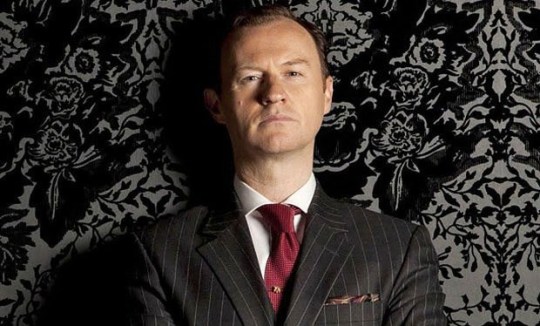
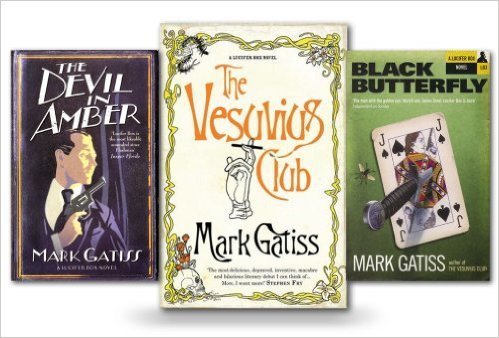
MG - The Man Behind The Genius
(via Get Ready to Love Mark Gatiss)
“Can we just sit here and watch this Spider-Man cartoon?” Mark Gatiss smiles slyly but it’s not clear if he’s completely kidding. We’re sitting on a couch in The Museum of the Moving Image in Queens, New York where a small retro-TV is playing an appropriately retro episode of Spider-Man and His Amazing Friends. “I love cartoons,” Gatiss tells me. “Did you ever see the old Star Trek cartoon? It’s brilliant. It’s basically like season four.”
The guy sitting next to me might look like Mycroft Holmes, but he barely sounds like him at all. This guy is softer, more childlike, more down to talk about whatever, so long as those things are James Bond, Sherlock Holmes, Doctor Who, superheroes, Star Trek… In short, if you meet Mark Gatiss, you want to be best friends with him instantly.
For the uninitiated: Mark Gatiss is the co-creator (with Steven Moffat) of Sherlock. He’s also an actor IN Sherlock as Mycroft Holmes, Sherlock’s snippy, brilliant older brother. He’s written for Doctor Who numerous times, including last season’s “Robots of Sherwood,” as well as the classic Dickens 2005 episode “The Unquiet Dead.” He’s got a recurring role on Game of Thrones as Tycho Nestoris of the Iron Bank, but has roots in the famous British comedy The League of Gentlemen. In short: he’s done some things that are beyond impressive.
Our chat is talking place two hours ahead of The Museum of the Moving Image’s special screening of the Doctor Who episode “Sleep No More,” which is the one Mark wrote for this season. And yes, I can call him Mark, because he told me to. Glancing over at my open-notebook, full of my chicken-scratch questions, he spies the word “Gatiss,” at the top of the page complete with a frantic double underline. “Don’t say ‘Moffat’ or ‘Gatiss,’” he coos. “Say ‘Mark.’”
To say Mark Gatiss is disarming would be an understatement similar to saying Sherlock Holmes is smart. It’s not that Mark is disarming, it’s like you and he have been exchanging dog-eared paperbacks for years and this conversation about the animated Star Trek from the 70s is old hat. After we talk about how great the writing is on that cartoon Trek, I ask him if he’d ever want to write for Star Trek.
“The new series?!!“I love Star Trek, so yeah, I wouldn’t say no. Simon Pegg’s writing the new one [Star Trek Beyond]. So yeah. You never know!”
Is there anything else—any other established universe—Mark Gatiss would like to write for other than Star Trek?
“Nooo…No. I want to do something new. But it’s so hard to get it off the ground. I’ve said this many times, and it’s absolutely true. That there is a reason why people revisit brands that are so familiar; it’s because they’re so familiar! And it’s getting harder and harder to try and convince people to take a punt at something new. So, that is absolutely vital. Otherwise, there’s no blood in it—and I say this knowing that I’m associated with two of the biggest reboots in history—and people will always revisit Sherlock Holmes. And I think that now that Doctor Who has really returned after its absence, Doctor Who is imperishable. It will probably stop again one day and then come back again, because that’s what it does. Like anything. But, I would love to do something that people look back on fondly, because it was a brand new thing. But it’s terribly difficult—A. to think of it! B. To get it off the ground. What is the new thing! Sherlock Holmes himself said there is nothing new under the sun!”
What if Steven Moffat left Doctor Who? Would Mark still write for Doctor Who?
“Of course I’d still write for Doctor Who! If they’d have me! It’s a continuing honor and thrill! I would say that unlike Russell [Davies] saying ‘that’s me, done,’ I think that if Steven were to leave, he’d still come back after a few years and do another one. Because he loves it. I mean, Russell loves it too! But, I think Russell saw it as his take on it and that was it. Which is a very grown-up way of moving on. But I can’t resist the urge.”
When you’re hanging with Mark Gatiss, who wants to be a grown up anyway?
Would Mark want to be the showrunner of Doctor Who if Steven Moffat left?
“The truth is I know how incredibly demanding it is. And one of things that makes it very difficult to see is the sort of casual attacks Steven has had to put up with over the past few years. It’s incredibly hard work and they care so much. It’s a 24 hour job. And when people say ‘why can’t you make more episodes!?’ I mean, the episode we’re watching tonight: I was sent the final effect shot the day before I left for New York. That episode is just complete and it’s on this Saturday. There are so many things to consider. But to answer your question, I know how hugely demanding [showrunning] is, but also how hugely rewarding it would be. It’s a huge, life-changing decision. I’m an actor and a writer. I couldn’t act if I did it. Because I wouldn’t have time. The only thing I could act in would possibly be Doctor Who. WAIT A MINUTE! I’ll DO IT!”
At this, Mark begins giggling like a madman, throwing his head back and repeating “I’ll do it! This will effect my whole life? HA HA HA HA! I’LL DO IT!!”
The comedian, the sketch-comedy writer version of Mark Gatiss has emerged! Fittingly, we switch our conversation to the importance of humor in his writing. How and why is he just so damn funny? Is Doctor Who and Sherlock nothing without humor?
“Humor is fundamental. I couldn’t agree with you more. There’s a fundamental misunderstanding of why we love these shows. Essentially from slightly humorless people who thinks it needs to be po-faced all the time. The man who created the Daleks—Terry Nation—was Tony Hancok’s writer. He was a very, very funny man who could also write great science fiction. That’s what Russell is. That’s what Steven is. What I am. Lots of people. Humor is bound-up in the DNA of [Doctor Who]. ‘Robots of Sherwood,’ for instance, is a straightforward romp. But, you should no more criticize a show for being too funny—what’s wrong with too funny, anyway? You hear that a lot. Someone says ‘it’s too funny.’ WHAT? Too funny? Would your prefer it was moderately funny? I’d go for much too funny any day. That doesn’t mean you’re messing with the format, that you’re spoiling it. And if you look back at the history of the show, that’s what it’s always been at its best. It doesn’t get much grimmer than “Genesis of the Daleks.” But of course there’s humor. Of course there is. It might be pitch black, but it’s there. And sometimes the level is pitched one way and sometimes the other. But to me, it’s absolutely quintessential to Doctor Who, it’s a fun show.”
Though I would have loved to talk to Mark for hours only about Sherlock Holmes and his favorite stories and which movies are his personally, secret preferences, I decide that since we’re already best friends, we’ve had that conversation in some alternate world. Instead, I’m interested in continuity. Sir Arthur Conan Doyle flippantly didn’t care about continuity. Does Mark Gatiss care about continuity?
“Because we live in such an overly-examined age, in which everything is easily consumed and spat-out, everything has taken on a ludicrous level of importance. If Conan Doyle hadn’t had his famously lax attitude toward continuity, we wouldn’t be able to have the fun we have. From speculating on the strange fact that Professor Moriarty and his brother have the same Christian name, that Watson’s war-wound moves about, that Mary calls John “James”! I’m sure people did write to [Doyle] and complain, because there were always fans! But the thing is, it’s fine. My attitude is this: get it right if you can because if you’re perversely getting it wrong, it looks careless. But. Absolutely frankly: if someone came up with an idea for Doctor Who that flatly contradicted something that happened in 1967, fuck it. Of course fuck it! Someone once said to me ‘six months ago is ancient history,’ in terms of television. That’s true, because you’re talking about the general audience and not the fan audience. AND if you flatly contradicted something that happened in 1967, the fans would find a way of explaining it. I remember—in talking about Star Trek—someone telling me that reason William Shatner has so much eye shadow on in “Journey to Babel”—more than ever—is because Star Fleet officers are allowed to wear a certain amount of make-up during formal ceremonies! WHAT?!! I mean you don’t have to explain it! The Master was a snake at one point!”
Looking smooth, and talking smooth are something Mark Gatiss knows how to do, and that’s partially because he’s a big Bond fan. Could secret government mastermind Mycroft exist in the Bond universe?
“He does exist in the Bond universe! We made an explicit reference. In ‘His Last Vow,’ I say ‘As my esteemed colleague is fond of pointing out, what the country needs sometimes is a blunt instrument. Which is M! From the books! And of course I’d love to write a Bond film. It’s the one that’s eluded me. Me and Steven we both wanted to do Bond. I did From Russian With Love on radio!”
As our time comes creeping up on us, and the Spider-Man cartoon winds down, I ask Mark if there’s a world for a gay Bond? What about a straight Sherlock? The last one gets a guttural laugh from him, and we launch into the territory of diversity among established characters and fandoms.
“The point is to me, none of these things should be done because anyone feels pressure to tick a box. A show like Doctor Who has brilliantly celebrated gay people, incidentally, which to me is proper progress. But I think personally, there should absolutely be a female Doctor, a black Doctor, an Asian Doctor, but it’s because someone comes along who is absolutely indisputably the person for the job. With James Bond, it’s a literary antecedent. If you were for reasons of box-ticking made James Bond gay, that’s not James Bond. By all means have a gay spy! I’ve written about one myself! [Mark’s Lucifer Box novels] If you want to do a gay British Spy, adapt my books! That’s my advice. Do a franchise based on my books!”
Will Mark Gatiss fulfill his dreams of creating the next “new” thing that we will all love and obsess over? What is the future for our beloved Doctor Who/Sherlock writer? In addition to a film, more Doctor Who and the three new Sherlocks, that is. What is Mark’s secret project he hasn’t talked about yet?
At this he narrows his eyes, pats my leg and says with a Mycroft twinkle and almost a sneer:
“Can’t talk about it.”
Mark’s Doctor Who episode “Sleep No More” airs this Saturday.
9 notes
·
View notes
Link
via Barb's Place I foolishly made a comment on Facebook the other day, to the effect that I used to love the Pern books, but couldn't enjoy them any longer, because [reasons.] This ticked off a bunch of Pern fans. Which was my fault; I shouldn't have made a negative comment on an "I love Pern!" post. (slaymesoftly, I'm really sorry.) I decided that trying to explain why I thought the Infamous Tent Peg Interview was believable even though it wasn't corroborated, and how even if the fan who reported it was lying through his teeth, there was more than enough well-documented gender-and-class-and-sexuality-related stuff in Anne McCaffery's work to make me itchy regardless, was not a hill I wanted to die on (particularly in someone else's space.) So I made a vague and hopefully polite "YMMV" response and exited stage right.
One of the people who found my comment annoying responded with the double whammy of "Lol who gets upset about a ~fantasy~ series?" and "Lol the books are ~of their time!~ If you think Pern is bad, you should read Heinlein!" While the first one makes me roll my eyes, it's the second one I want to talk about. As it happens, I have read Heinlein, and Asimov, and Clarke, and Smith, etc., not to mention quite a lot of even older non-SF fiction. I'm very familiar with putting books and authors into the context of the time in which they were written. It's why I can still enjoy 90% of the original Doctor Doolittle Books despite some pretty appalling-by-today's-standards racism, but I can't enjoy Albert Payson Terhune's dog stories, which were written at about the same time, and also contain appalling-by-today's-standards racism. The difference is, Hugh Lofting was trying to write sympathetic, heroic non-white characters, who were invaluable friends and allies of the main character. Terhune was writing villains who were villains because they were lower-class and non-white. By today's standards, they both produced awful stereotypical caricatures, but the intent of the two authors could not have been farther apart. Both authors were "of their time." But there's a huge variation in people who are "of their time." There's a huge variation in readers as well. Just because I can stomach a particular book doesn't mean that everyone can or should have to.
One big reason that the Pern books bother me more than other books of the same era is that their "time" is awfully damned long. It's true that the series started in the 1960s, but it continued well into the 2000s. Pern is hardly the only series in this situation. There's another far less well-known series, The Sector General books by James White, which had some similar issues. Sector General was a space hospital serving dozens of alien races, and the gimmick of the series was that the doctors had access to mind recordings of great alien doctors. So a human who had to treat an alien could zap a mental overlay from a doctor of that species into his own head. And it was always "his" own head. The series began in 1957, so unsurprisingly, the author wrote all the doctors as male. A decade or more later, and several books into the series, cue a bunch of fan letters asking why Nurse Murchison, who was obviously as smart and medically capable as the male characters, wasn't on track to become a Diagnostician the same way Dr. Conway was. So the author introduced a retcon to the effect that women couldn't become Diagnosticians, because their minds were incapable of handling the alien overlay.
In the original 1960s Star Trek series, there were no female captains. In one episode, it was strongly implied that this was Starfleet policy. As the decades rolled on, and the franchise started to create series set before TOS, they had to decide how to handle the backstory. Was Janice Lester denied command because she was a woman, or because she was unstable, or both? In this case, the Powers That Be waved their retcon wand and said, "There have always been female captains, DUH!" (I'm fairly certain that, having finally bitten the bullet and introduced a gay character, that they'll do the same there. There have always been queer officers in Starfleet, DUH.)
It's a lot more difficult to find a series where an issue comes up which the author never intended to address, or even considered an issue, and yet, when it's raised, the author bites the bullet and tackles it head on. The only one I can think of off the top of my head is Stephen Brust's Vlad Taltos series, which started out as a flash-bang witty fantasy series about an assassin. Several books in, rumor has it that a friend of the author's was killed in real life. That incident made him reassess his own character, and the series suddenly took a deeper, darker tone, and Vlad became a deeper, richer character.
The bottom line is, if you write anything long enough, the world is going to catch up to you, and very likely pass you by. It can be hard to deal with, especially for authors who are used to being seen as ahead of their time. But when that happens, you have a choice. You can double down on the Objectionable Thing, say that it's just the way this particular world is. Or you can say well, the Objectionable Thing wasn't really a Thing at all; it just looked like that in the first book. Pay no attention to the man behind the curtain! OR you can look at your world and your characters and say, yeah, the characters ARE sexist/racist/stone cold killers/whatever. And that sucks, because I didn't mean them to be. But the good thing is, if Objectionable Thing is due to the characters being wrong, instead of being Just The Way The World Is, then the characters can change. And so can the world.
comments
9 notes
·
View notes
Text
Thoughts on the comic book industry, Part 6
I've been touching on this on and off during this prolonged rant about the state of the comic book industry, but there's no way to continue this rant without going into detail on this point. It's at least half the reason the industry is in such ruin, and it's a big reason why the major publishers are so unwilling to get with the times and get their acts together.
Over the past 3 decades, the major publishers have cultivated a core audience of regressive, close-minded, selfish fanbrats who (a) are in lockstep with the tastes and preferences of the Big 2, (b) are resistant to any kind of beneficial change, and (c) are ready and willing to excommunicate anyone who, shall we say, "isn't of the body." Essentially, what little remains of the readership is a twisted hybrid of Landru from Star Trek and the Buddy Bears from Garfield. (Although I suppose another Star Trek villain, Gorgan, applies as well – "Our purity of purpose cannot be contaminated by those who disagree.") All the awful stereotypes associated with geek culture? These are the people on whom those stereotypes are based.
If you think the Big 2 don't give a shit about the integrity of their characters, or about the quality of the stories, or about the legacies they're supposed to be caretaking...well, neither does their core audience of choice. The tiny minority they cater to may make a lot of noise about preserving the "history" of the characters, but they define that history purely by their pet incarnations and dismiss everything outside of that. For DC, the "history" its target audience wants preserved is the 1986-2011 period (or, for what's left of the Superman fandom, 1986-1999 only), with a burning, outspoken contempt of anything that doesn't bear at least a surface similiarity to it. Hence "Rebirth," despite being a creative and sales failure, being praised to the skies on social media. For Marvel, what's left of its audience doesn't give a damn about the company's history at all; they just accept whatever's thrown their way. There's a reason why the term "Marvel Zombies" existed long before the comic of the same name. That same willful ignorance and disregard of the history and legacy of the Big 2 even extends to the creators they choose to lionize or condemn. If it's a creative team or a specific era the fandom has decreed holy writ, they can get away with anything they want and the worst aspects of that era will be whitewashed or made excuses for. But if its creative teams or eras the fandom doesn't approve of? Everything about it, no matter how innocuous or even based in the franchise's existing history, will be excoriated as an abomination. Everything the remaining fandom upholds or tears down has nothing to do with the actual history of the industry and everything to do with their personal tastes.
(By the by, this also extends to comic book adaptations as well. Whoever the fandom chooses to rally behind can do no wrong regardless of how destructive and ruinous their ideas are, while filmmakers the fandom chooses to hate can't win no matter how respectful they try to be.)
It also doesn't help that the target readership of the major publishers also shares the same nihilistic, meanspirited attitude so prevalent in most comic book stories now. It's not uncommon for the remaining fandom to justify malicious event-gimmicks with comments like "Why should the heroes' lives be nothing but rainbows all the time?" (This was an actual defense for Cry for Justice/Rise of Arsenal, I kid you not.) Characters behaving horribly, like Lois Lane being emotionally abusive or Batman being willing to betray and assault the people closest to him (his physical attacking of Alfred in All-Star Batman in particular) gets praised as being "badass," "cool," "strong and empowering," etc. Hell, even Spider-Man openly admitting that he was making his deal with Mephisto for purely selfish reasons – that he didn't want to honor Aunt May's wishes to die peacefully because he didn't want to feel guilty about his mistakes leading to her death – was praised as heroic and noble even though he explicitly stated his intentions on-panel. And look at the SJW characters Marvel's been pushing for years. Many of them are hostile and unlikable people, and yet the readership will defend them by accusing naysayers of sexism, racism, and any other politically-charged insult they can think of. In a lot of ways, what passes for comics from the Big 2 these days is, in essence, glorified Mary Sue fiction, with the creators and the remaining fandom glorifying themselves and their pet choices.
And as a result of this, many characters who were once noble and honorable are turned into absolute jerks, characters who once had depths and layers are reduced to one-dimensional cutouts with no real personality or soul, and characters with a history of being unlikable get exalted and showcased at the expense of all else. And what's left of the fandom wants it this way, because it feeds their own sense of superiority and allows them to project themselves onto the characters. If you dare to point out that certain characters have been stripped of their humanity and nobility and are just one-note, shallow husks, the remaining fandom will assert that such characters are "cool" and "deep," and that you're just an idiot or a fan of another character who doesn't know any better. If you point out that certain female characters are consistently portrayed as selfish, entitled, and cruel for no good reason, you'll be accused of misogyny and "not being able to handle strong women." And so on. To point out flaws and failings in the fandom's golden calves of choice is tantamount to personally insulting the fandom itself. Which is the same mindset DC and Marvel have when faced with criticism.
There's also an insane, utterly baffling refusal to even consider even moderate, reasonable updates and/or changes to certain properties, whether it's long-overdue costume upgrades, shedding outdated tropes or settings, or even replacing old creative teams who've overstayed their welcome with fresh blood. Over and over again, you'll hear "If it ain't broke, don't fix it" as a catch-all excuse to never change anything at all, no matter how necessary those changes are or if the old creative teams are completely out of anything resembling fresh ideas. In some cases, the industry's target audience will point to said old creators' past successes (if any) as an excuse to never replace them with new talent. And if the fandom decides they won't accept any new talent, there's no excuse they won't use to dismiss or demonize said new talent. Back in the early 2000s, for example, Ed McGuinness, Doug Mahnke, Mike Wieringo, and other creators working at DC were repeatedly bashed for being "too manga" for the fans' liking. Never mind that Mahnke's work doesn't look anything like manga, never mind that Wieringo had previously worked at DC during the '90s on high-profile books, and never mind that McGuinness owed his style more to American animation. They were replacing old, worn-out talent that the fandom didn't want to let go of, therefore "too manga" was seen as a valid excuse to hate their work. Even artists like the late Darwyn Cooke and Eric Powell have been bashed for being "too cartoony" or "too childish," despite it being well-known that cartoony art styles are much harder to pull off because you can't hide behind a lot of detail.
The refusal to accept anything but old, stale creators on the same properties ad nauseum often extends to a refusal to even consider artists drawing anything but the same damn thing over and over again. With Superman, you still have, decades after the fact, people wanting nothing but Curt Swan or Curt Swan imitators drawing the books, never mind that the franchise visually stagnated during the Bronze Age as a result. With creators like Darryl Banks, Scott McDaniel, Mark Bagley, and – before his career-ending stroke – Norm Breyfogle, fans don't want them drawing anything but their "signature" characters, and are actively hostile to even the suggestion that those artists could or should draw anything else. Speaking from personal experience, I've found that 90% of the time artists love drawing something other than their usual fare. But talk about this with the comic book fandom that exists now, and they treat it as an insult to the artists and an unnecessary risk because "you're making them draw things they have no affinity for." The idea of comic book artists being versatile and able to draw any kind of subject matter doesn't even occur to them at all, and they treat it as an affront if you even suggest it. Again, all they want is stale, stagnant comfort food, even if it conflicts with what the artists themselves would want to do.
Then again, that same inability to look beyond their personal tastes is reflected in their willful ignorance of the history of comic books, and even of the nature of comic storytelling. Over and over again, you see the existing fandom claiming to love and protect the "history" of the Big 2, but that history begins and ends with their pet incarnations. How often have you seen DC's pre-1986 history trashed and mocked on both fan forums and comic-centric blogs? A lot. There's very little love, if any, for anything published before Crisis on Infinite Earths. And a lot of times, the fandom will parrot outright lies – be they fan-made or even pimped by the publishers themselves – as absolute historical fact despite what was actually published in the past. (Batman's pre-Frank Miller history and Gwen Stacy and Mary Jane Watson's roles in Spider-Man immediately come to mind as examples of such.) Even worse, sometimes the fandom will pimp their pet creators as being more deserving of creator credit than the characters' actual creators, or even advocate abolishing creator credits altogether if they decide they don't like either the original creators or the creators' estates. As for the willful ignorance of how comic storytelling works, here's a very worrying example: Marvel artist Greg Land is notorious for copy-pasting his old work and tracing/swiping from other sources, including porn and other artists' work. This habit has cost him friends and creative partners over the years. And yet, when his fans came to his defense, not only were his habits excused and defended, but some even made the assertion that Land isn't responsible for telling a story; he's just there to draw pretty pictures and that artists aren't there to tell stories in the first place.
This is a direct violation of what comics are: writing and art coming together to tell a story visually. In many cases, creators write and draw their own work. Visual storytelling is what comics are all about. But because an artist the fandom decided to champion was outed as a hack, some of his defenders decided that the rules of comic storytelling didn't exist, much less apply to said artist.
This should worry anyone who actually does love comics as a medium, because this is the audience the industry has been cultivating over the last 26-32 years. A tiny, whiny minority readership that doesn't have any real love or knowledge of the medium or the characters therein, that only wants the same tired old shit no matter how stale or outdated it is, that mimics the tastes and attitudes of the creators responsible, and is insanely devoted to either no change whatsoever regardless of merit or to extreme and destructive changes by their pet creators. I mean, really, is there any difference between legendary social media bully Michael "ManoftheAtom" Sacal screaming and yelling at anyone who doesn't share his "Iron Age only or else" mentality and creators like Mark Waid and Joe Quesada insulting and bullying anyone who doesn't share their distorted, selfish personal interpretations of their pet eras? Is there any real difference between fans incapable of accepting even minor and harmless updates and creators like Mike Manley going "Fuck your [insert character]!" on Facebook in regards to anything but his pet interpretations of said characters? (Ironically, Manley famously called fans unwilling to accept anything but Frank Miller's Batman "babymen." Apparently he's not capable of heeding his own advice.) Is there any real difference between fans who don't even understand how comic storytelling works at all and editors like Tom Brevoort who defend hack artists by pointing to sales (such as they are) and if their tracing and swiping "looks good"? Is there any difference at all between fans who spout bad SJW/far-left jargon and comic book pros who do likewise? And is there any difference between fanbrats who spew bile toward cosplayers and comic book pros who do the same damn thing? The answer is no. What remains of the comic book fandom is nothing but an echo chamber for the industry and its sycophants. No room for anything other than the chosen dogma, no room for anything resembling growth, change, evolution, or even just new ideas in general.
Making matters worse is that like any echo chamber, there's a huge amount of infighting when it comes to how pure of a fan you are and how devoted you are to the chosen dogma. Let's be honest; comic book fans don't just hate anyone not already in the clique, but they can't even play nice with each other. Male fans will tear each other apart for even slight differences of opinion, and female fans will tear each other apart for the same reason or even for daring to depart from the far-left/feminist/SJW bent of websites like Girl Wonder.org, The Mary Sue, and the Dreamwidth version of Scans Daily. (By contrast, the original Livejournal version of Scans Daily was a far more tolerant and welcoming community than what replaced it.) And when male and female fans collide for whatever reason...forget it. Their agendas are too polar opposite for them to ever have any common ground (the feminist/SJW fans crying sexism over anything that even slightly evokes female sexuality and hardcore male fans whining endlessly about anything that isn't fanservice sleaze). There's a reason why comic book fandom has a such a negative image attached to it. It's so insular, so arrogant, so unwilling to bend from its sense of self-entitlement that there isn't any place for new fans, or even older fans who are far more moderate and willing to accept change as necessary. Nobody's going to want to be part of an industry and/or fan community that tries to dictate what you can't or can't like, what you can or can't think, or how you can or can't treat anyone not already in the existing clique.
Don't ever expect these guys to show any self-awareness if or when it's pointed out that their attitudes are not only strangling the life out of comics, but also giving comic book fandom a deservedly terrible reputation. Any time this lunatic fringe gets called out on its bullshit, they repeatedly, without fail, justify their behavior by calling it "passion." They see themselves as the true believers, the chosen ones to whom the industry truly belongs and thus anything they say and do is A-OK. No, I'm sorry, but that's not how any of this works. Being utter jerks to anyone not already in their clique is not "passion." Being insanely hateful and willfully ignorant while congratulating each other for being "scholars and gentlemen" is not "passion." Demanding and encouraging creative and artistic stagnation is not "passion." Bullying each other over perceived fandom purity is not "passion." And when they make it clear over and over again that their regard for the medium begins and ends purely with their personal tastes, that's not "passion," either. It's just plain being a selfish ass. These people have just as much love for comics as the major publishers do...little to none. It's all about self-aggrandizement for them, and they're too wrapped up in themselves to realize it.
Which is going to bring us to the next issue that needs to be broached, an issue that could and likely will spell the death of the comic book industry as we know it.
3 notes
·
View notes
Text
Dead Fandoms, Part 3
Read Part One of Dead Fandoms here.
Read Part Two of Dead Fandoms here.
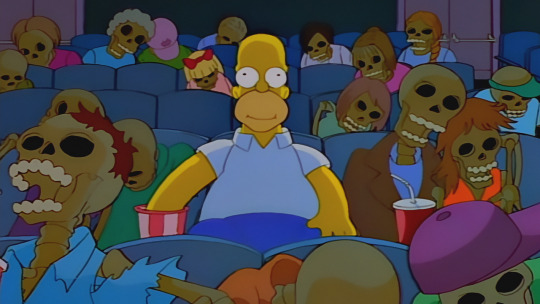
Before we continue, I want to add the usual caveat that I actually don’t want to be right about these fandoms being dead. I like enthusiasm and energy and it’s a shame to see it vanish.
Mists of Avalon
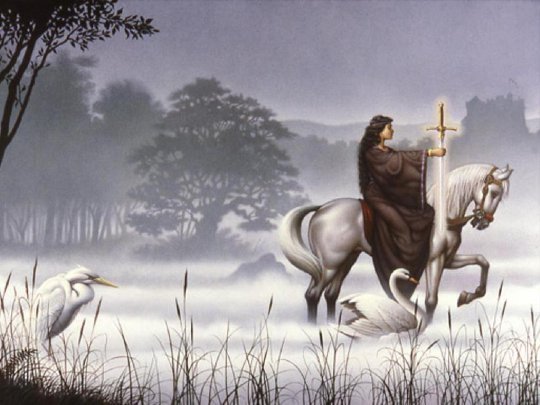
Remember that period of time of about 15 years, where absolutely everybody read this book and was obsessed with it? It could not have been bigger, and the fandom was Anne Rice huge, overlapping for several years with USENET and the early World Wide Web…but it’s since petered out.
Mists of Avalon’s popularity may be due to the most excellent case of hitting a demographic sweet spot ever. The book was a feminist retelling of the Arthurian Mythos where Morgan Le Fay is the main character, a pagan from matriarchal goddess religions who is fighting against encroaching Christianity and patriarchal forms of society coming in with it. Also, it made Lancelot bisexual and his conflict is how torn he is about his attraction to both Arthur and Guinevere.
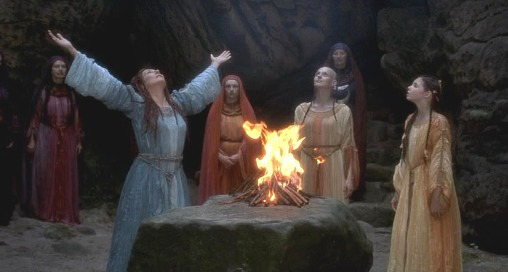
Remember, this novel came out in 1983 – talk about being ahead of your time! If it came out today, the reaction from a certain corner would be something like “it is with a heavy heart that I inform you that tumblr is at it again.”
Man, demographically speaking, that’s called “nailing it.” It used to be one of the favorite books of the kind of person who’s bookshelf is dominated by fantasy novels about outspoken, fiery-tongued redheaded women, who dream of someday moving to Scotland, who love Enya music and Kate Bush, who sell homemade needlepoint stuff on etsy, who consider their religious beliefs neo-pagan or wicca, and who have like 15 cats, three of which are named Isis, Hypatia, and Morrigan.
This type of person is still with us, so why did this novel fade in popularity? There’s actually a single hideous reason: after her death around 2001, facts came out that Marion Zimmer Bradley abused her daughters sexually. Even when she was alive, she was known for defending and enabling a known child abuser, her husband, Walter Breen. To say people see your work differently after something like this is an understatement – especially if your identity is built around being a progressive and feminist author.
Robotech
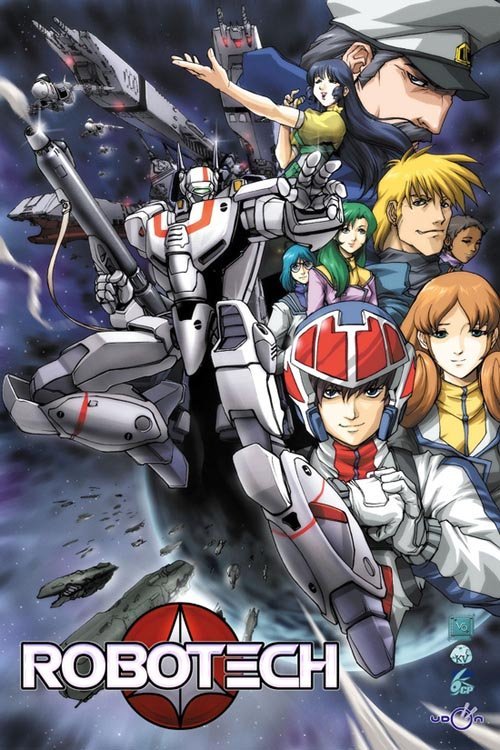
I try to break up my sections on dead fandoms into three parts: first, I explain the property, then explain why it found a devoted audience, and finally, I explain why that fan devotion and community went away. Well, in the case of Robotech, I can do all three with a single sentence: it was the first boy pilot/giant robot Japanimation series that shot for an older, teenage audience to be widely released in the West. Robotech found an audience when it was the only true anime to be widely available, and lost it when became just another import anime show. In the days of Crunchyroll, it’s really hard to explain what made Robotech so special, because it means describing a different world.
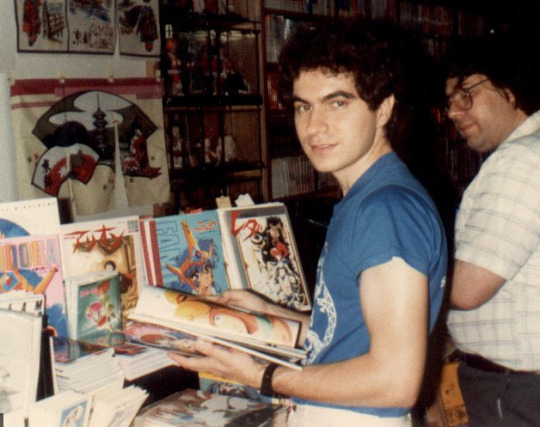
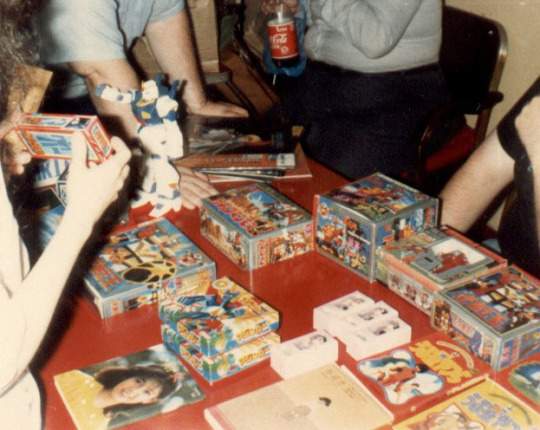
Try to imagine what it was like in 1986 for Japanime fans: there were barely any video imports, and if you wanted a series, you usually had to trade tapes at your local basement club (they were so precious they couldn’t even be sold, only traded). If you were lucky, you were given a script to translate what you were watching. Robotech though, was on every day, usually after school. You want an action figure? Well, you could buy a Robotech Valkyrie or a Minmei figure at your local corner FAO Schwartz.
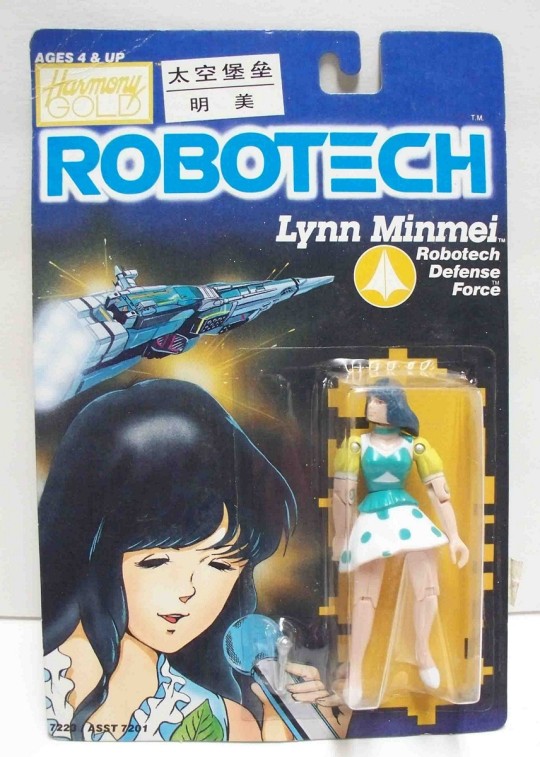
However, the very strategy that led to it getting syndicated is the very reason it was later vilified by the purists who emerged when anime became a widespread cultural force: strictly speaking, there actually is no show called “Robotech.” Since Japanese shows tend to be short run, say, 50-60 episodes, it fell well under the 80-100 episode mark needed for syndication in the US. The producer of Harmony Gold, Carl Macek, had a solution: he’d cut three unrelated but similar looking series together into one, called “Robotech.” The shows looked very similar, had similar love triangles, used similar tropes, and even had little references to each other, so the fit was natural. It led to Robotech becoming a weekday afternoon staple with a strong fandom who called themselves “Protoculture Addicts.” There were conventions entirely devoted to Robotech. The supposed shower scene where Minmei was bare-breasted was the barely whispered stuff of pervert legend in pre-internet days. And the tie in novels, written with the entirely western/Harmony Gold conception of the series and which continued the story, were actually surprisingly readable.
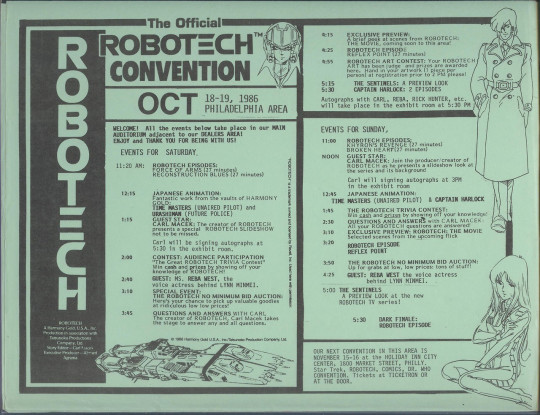
The final nail in the coffin of Robotech fandom was the rise of Sailor Moon, Toonami, Dragonball, and yes, Pokemon (like MC Hammer’s role in popularizing hip hop, Pokemon is often written out of its role in creating an audience for the next wave of cartoon imports out of insecurity). Anime popularity in the West can be defined as not a continuing unbroken chain like scifi book fandom is, but as an unrelated series of waves, like multiple ancient ruins buried on top of each other (Robotech was the vanguard of the third wave, as Anime historians reckon); Robotech’s wave was subsumed by the next, which had different priorities and different “core texts.” Pikachu did what the Zentraedi and Invid couldn’t do: they destroyed the SDF-1.
Legion of Super-Heroes
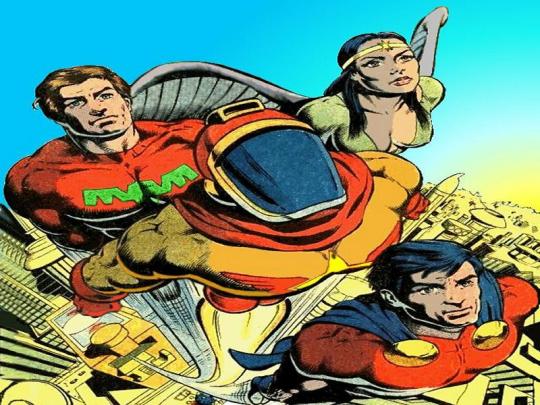
Legion of Superheroes was comic set in the distant future that combined superheroes with space opera, with a visual aesthetic that can best be described as “Star Trek: the Motion Picture, if it was set in a disco.”
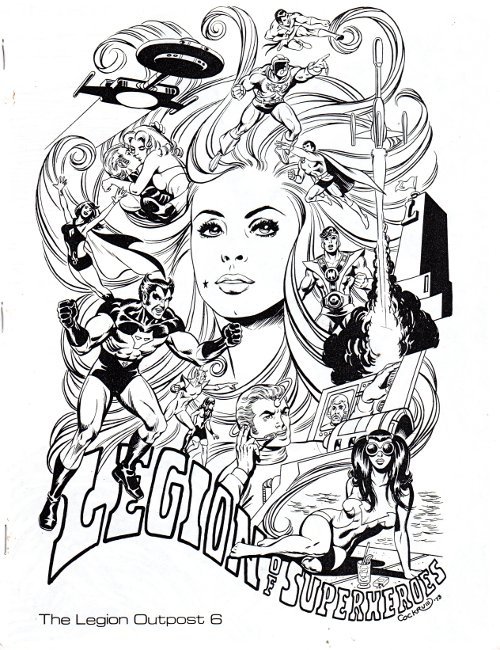
I’ve heard wrestling described as “a soap opera for men.” If that’s the case, then Legion of Super-Heroes was a soap opera for nerds. The book is about attractive 20-somethings who seem to hook up all the time. As a result, it had a large female fanbase, which, I cannot stress enough, is incredibly unusual for this era in comics history. And if you have female fans, you get a lot of shipping and slashfic, and lots of speculation over which of the boy characters in the series is gay. The fanon answer is Element Lad, because he wore magenta-pink and never had a girlfriend. (Can’t argue with bulletproof logic like that.) In other words, it was a 1970s-80s fandom that felt much more “modern” than the more right-brained, bloodless, often anal scifi fandoms that existed around the same time, where letters pages were just nitpicking science errors by model train and elevator enthusiasts.
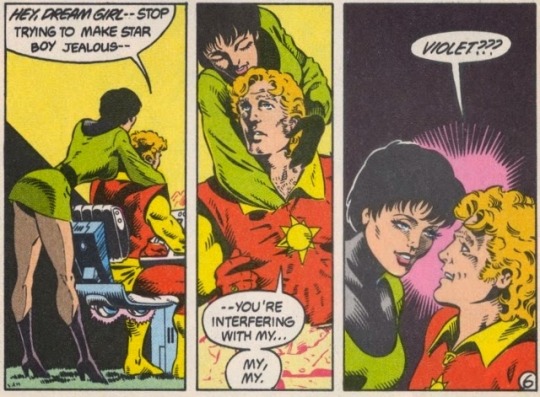
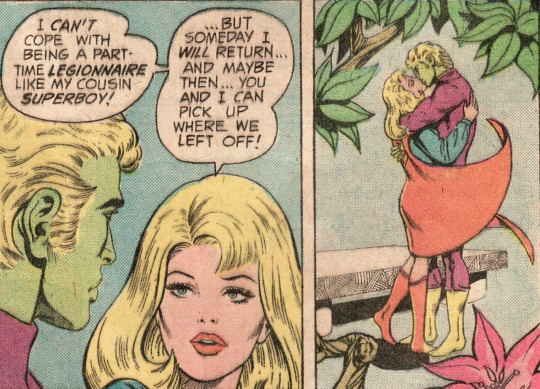
Legion Headquarters seemed to be a rabbit fuck den built around a supercomputer and Danger Room. Cosmic Boy dressed like Tim Curry in Rocky Horror. There’s one member, Duo Damsel, who can turn into two people, a power that, in the words of Legion writer Jim Shooter, was “useful for weird sex...and not much else.”
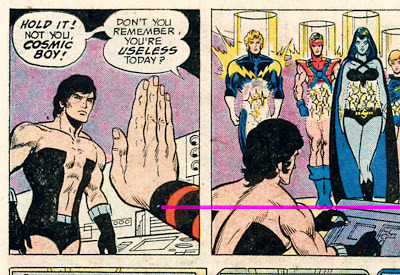
LSH was popular because the fans were insanely horny. This is, beyond the shadow of a doubt, the thirstiest fandom of all time. You might think I’m overselling this, but I really think that’s an under-analyzed part of how some kinds of fiction build a devoted fanbase.
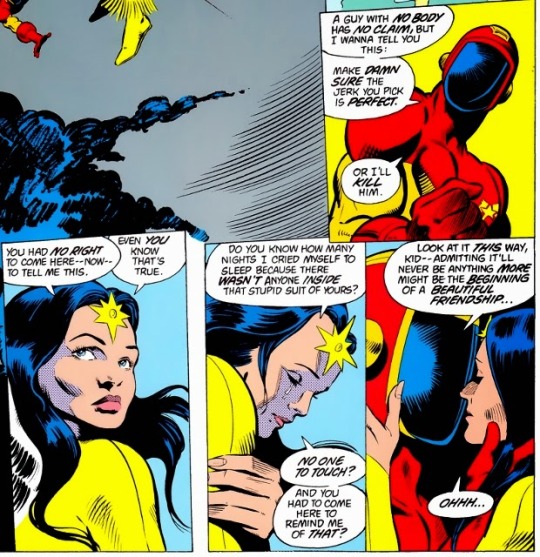
For example, a big reason for the success of Mass Effect is that everyone has a favorite girl or boy, and you have the option to romance them. Likewise, everyone who was a fan of Legion remembers having a crush. Sardonic Ultra Boy for some reason was a favorite among gay male nerds (aka the Robert Conrad Effect). Tall, blonde, amazonian telepath Saturn Girl, maybe the first female team leader in comics history, is for the guys with backbone who prefer Veronica over Betty. Shrinking Violet was a cute Audrey Hepburn type. And don’t forget Shadow Lass, who was a blue skinned alien babe with pointed ears and is heavily implied to have an accent (she was Aayla Secura before Aayla Secura was Aayla Secura). Light Lass was commonly believed to be “coded lesbian” because of a short haircut and her relationships with men didn’t work out. The point is, it’s one thing to read about the adventures of a superteam, and it implies a totally different level of mental and emotional involvement to read the adventures of your imaginary girlfriend/boyfriend.
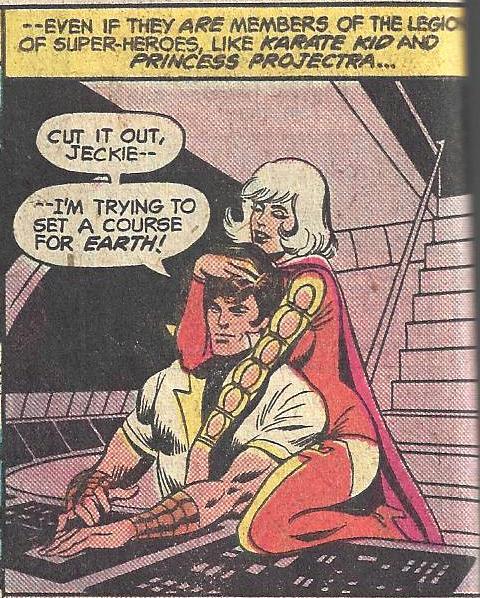
Now, I should point out that of all the fandoms I’ve examined here, LSH was maybe the smallest. Legion was never a top seller, but it was a favorite of the most devoted of fans who kept it alive all through the seventies and eighties with an energy and intensity disproportionate to their actual numbers. My gosh, were LSH fans devoted! Interlac and Legion Outpost were two Legion fanzines that are some of the most famous fanzines in comics history.
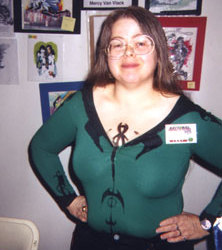
If nerd culture fandoms were drugs, Star Wars would be alcohol, Doctor Who would be weed, but Legion of Super-Heroes would be injecting heroin directly into your eyeballs. Maybe it is because the Legionnaires were nerdy, too: they played Dungeons and Dragons in their off time (an escape, no doubt, from their humdrum, mundane lives as galaxy-rescuing superheroes). There were sometimes call outs to Monty Python. Basically, the whole thing had a feel like the dorkily earnest skits or filk-singing at a con. Legion felt like it’s own fan series, guest starring Patton Oswalt and Felicia Day.
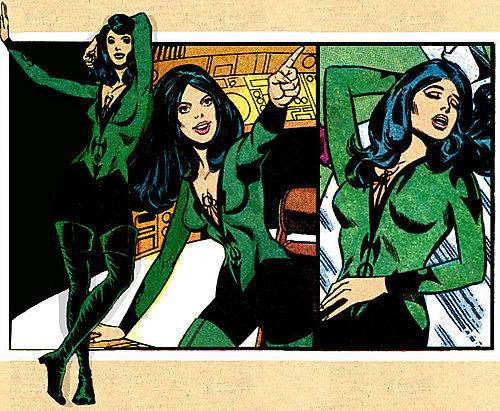
It helped that the boundary between fandom and professional was incredibly porous. For instance, pro-artist Dave Cockrum did covers for Legion fanzines. Former Legion APA members Todd and Mary Biernbaum got a chance to actually write Legion, where, with the gusto of former slashfic writers given the keys to canon, their major contribution was a subplot that explicitly made Element Lad gay. Mike Grell, a professional artist who got paid to work on the series, did vaguely porno-ish fan art. Again, it’s hard to tell where the pros started and the fandom ended; the inmates were running the asylum.
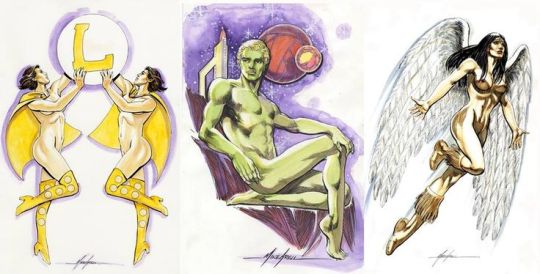
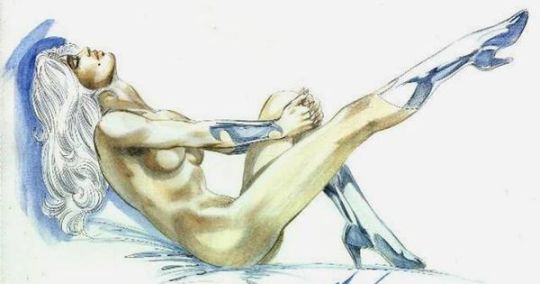
Mostly, Legion earned this devotion because it could reward it in a way no other comic could. Because Legion was not a wide market comic but was bought by a core audience, after a point, there were no self-contained one-and-done Legion stories. In fact, there weren’t even really arcs as we know it, which is why Legion always has problems getting reprinted in trade form. Legion was plotted like a daytime soap opera: there were always five different stories going on in every issue, and a comic involved cutting between them. Sure, like daytime soap operas, there’s never a beginning, just endless middles, so it was totally impossible for a newbie to jump on board...but soap operas know what they are doing: long term storytelling rewards a long term reader.
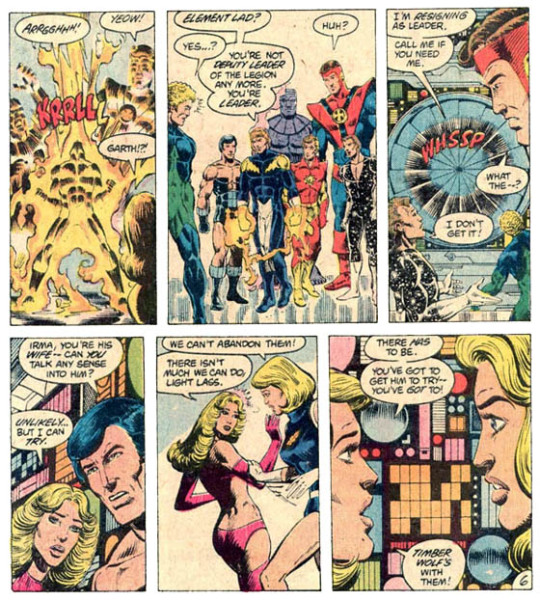
This brings me to today, where Legion is no longer being published by DC. There is no discussion about a movie or TV revival. This is amazing. Comics are a world where the tiniest nerd groups get pandered to: Micronauts, Weirdworld, Seeker 3000, and Rom have had revival series, for pete’s sake. It’s incredible there’s no discussion of a film or TV treatment, either; friggin Cyborg from New Teen Titans is getting a solo movie.
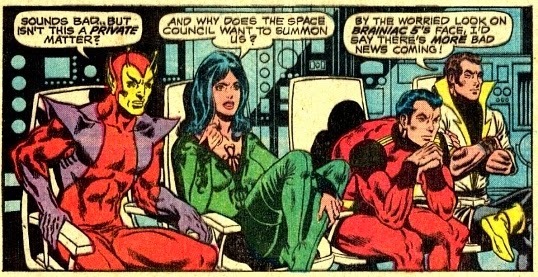
Why did Legion stop being such a big deal? Where did the fandom that supported it dissolve to? One word: X-Men. Legion was incredibly ahead of its time. In the 60s and 70s, there were barely any “fan” comics, since superhero comics were like animation is today: mostly aimed at kids, with a minority of discerning adult/teen fans, and it was success among kids, not fans, that led to something being a top seller (hence, “fan favorites” in the 1970s, as surprising as it is to us today, often did not get a lot of work, like Don MacGregor or Barry Smith). But as newsstands started to push comics out, the fan audience started to get bigger and more important…everyone else started to catch up to the things that made Legion unique: most comics started to have attractive people who paired up into couples and/or love triangles, and featured extremely byzantine long term storytelling. If Legion of Super-Heroes is going to be remembered for anything, it’s for being the smaller scale “John the Baptist” to the phenomenon of X-Men, the ultimate “fan” comic.
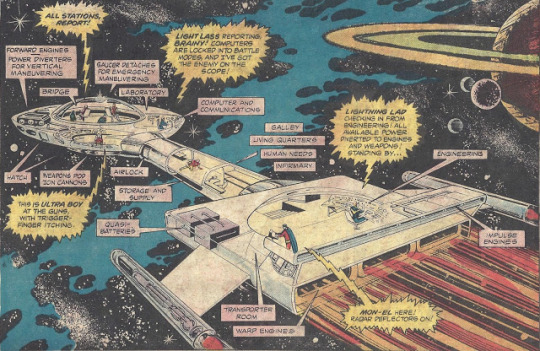
The other thing that killed Legion, apart from Marvel’s Merry Mutants, that is, was the r-word: reboots. A reboot only works for some properties, but not others. You reboot something when you want to find something for a mass audience to respond to, like with Zorro, Batman, or Godzilla.
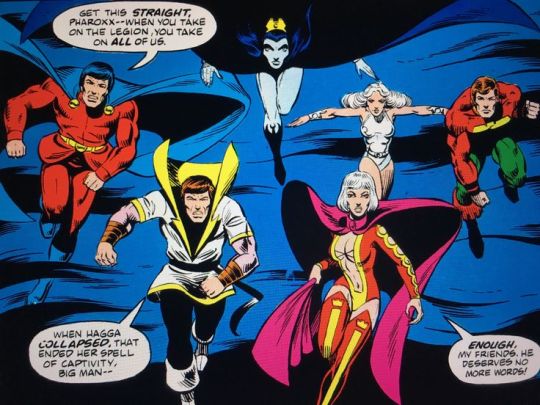
Legion, though, was not a comic for everybody, it was a fanboy/girl comic beloved by a niche who read it for continuing stories and minutiae (and to jack off, and in some cases, jill off). Rebooting a comic like that is a bad idea. You do not reboot something where the main way you engage with the property, the greatest strength, is the accumulated lore and history. Rebooting a property like that means losing the reason people like it, and unless it’s something with a wide audience, you only lose fans and won’t get anything in return for it. So for something like Legion (small fandom obsessed with long form plots and details, but unlike Trek, no name recognition) a reboot is the ultimate Achilles heel that shatters everything, a self-destruct button they kept hitting over and over and over until there was nothing at all left.
E. E. Smith’s Lensman Novels
The Lensman series is like Gil Evans’s jazz: it’s your grandparents’ favorite thing that you’ve never heard of.
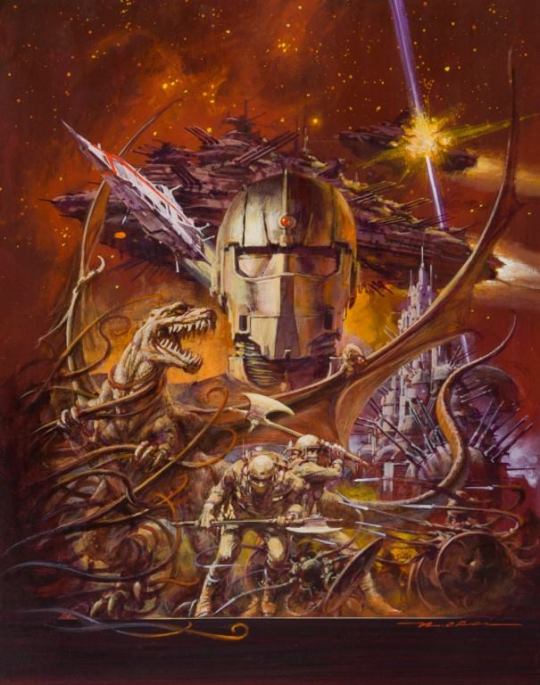
I mean, have you ever wondered exactly what scifi fandom talked about before the rise of the major core texts and cultural objects (Star Trek, Asimov, etc)? Well, it was this. Lensmen was the subject of fanfiction mailed in manilla envelopes during the 30s, 40s, and 50s (some of which are still around). If you’re from Boston, you might recognize that the two biggest and oldest scifi cons there going back to the 1940s, Boskone (Boscon, get it?) and Arisia, are references to the Lensman series. This series not only created space opera as we know it, but contributed two of the biggest visuals in scifi, the interstellar police drawn from different alien species, and space marines in power armor.
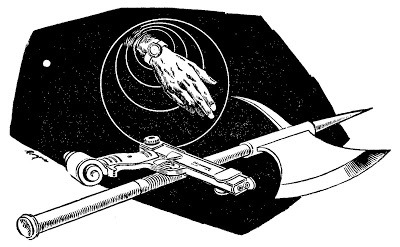
My favorite sign of how big this series was and how fans responded to it, was a great wedding held at Worldcon that duplicated Kimball Kinnison and Clarissa’s wedding on Klovia. This is adorable:
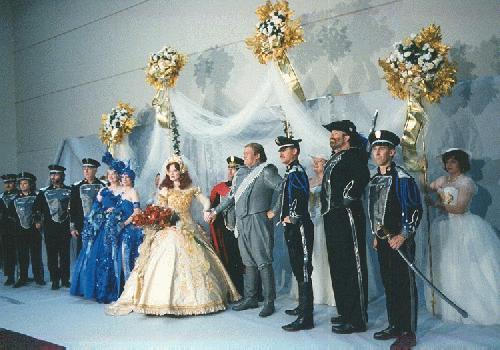
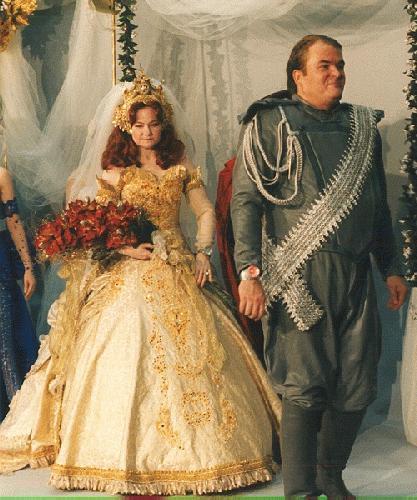
The basic story is pure good vs. evil: galactic civilization faces a crime and piracy wave of unprecedented proportions from technologically advanced pirates (the memory of Prohibition, where criminals had superior firearms and faster cars than the cops, was strong by the mid-1930s). A young officer, Kimball Kinnison (who speaks in a Stan Lee esque style of dialogue known as “mid-century American wiseass”), graduates the academy and is granted a Lens, an object from an ancient mystery civilization, who’s true purpose is unknown.
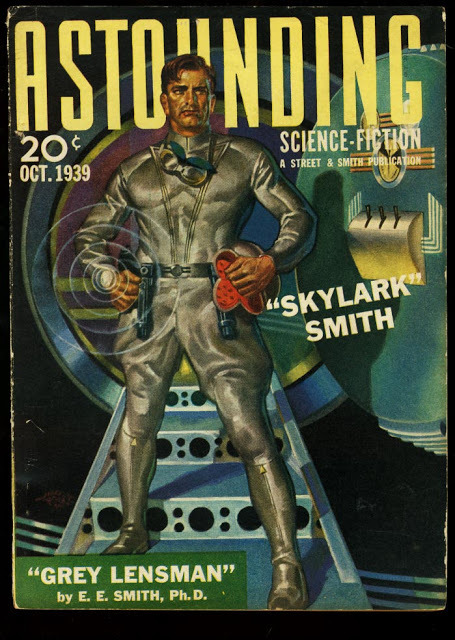
Lensman Kinnison discovers that the “crime wave” is actually a hostile invasion and assault by a totally alien culture that is based on hierarchy, intolerant of failure, and at the highest level, is ruled by horrifying nightmare things that breathe freezing poison gases. Along the way, he picks up allies, like van Buskirk, a variant human space marine from a heavy gravity planet who can do a standing jump of 20 feet in full space armor, Worsel, a telepathic dragon warrior scientist with the technical improvisation skills of MacGyver (who reads like the most sadistically minmaxed munchkinized RPG character of all time), and Nandreck, a psychologist from a Pluto-like planet of selfish cowards.
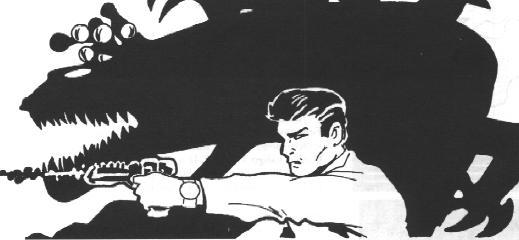
The scale of the conflict starts small, just skirmishes with pirates, but explodes to near apocalyptic dimensions. This series has space battles with millions of starships emerging from hyperspacial tubes to attack the ultragood Arisians, homeworld of the first intelligent race in the cosmos. By the end of the fourth book, there are mind battles where the reflected and parried mental beams leave hundreds of innocent bystanders dead. In the meantime we get evil Black Lensmen, the Hell Hole in Space, and superweapons like the Negasphere and the Sunbeam, where an entire solar system was turned into a vacuum tube.
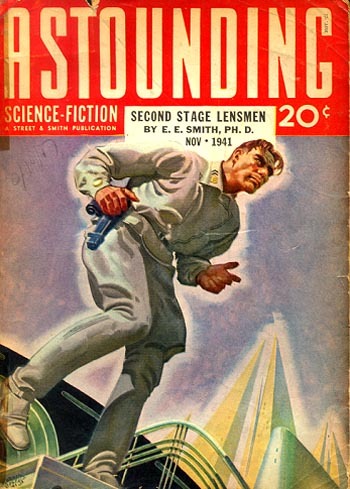
It’s not hard to understand why Lensmen faded in importance. While the alien Lensmen had lively psychologies, Lensman Kimball Kinnison was not an interesting person, and that’s a problem when scifi starts to become more about characterization. The Lensman books, with their love of police and their sexism (it is an explicit plot point that the Lens is incompatible with female minds – in canon there are no female Lensmen) led to it being judged harshly by the New Wave writers of the 1960s, who viewed it all as borderline fascist military-scifi establishment hokum, and the reputation of the series never recovered from the spirit of that decade.
Prisoner of Zenda
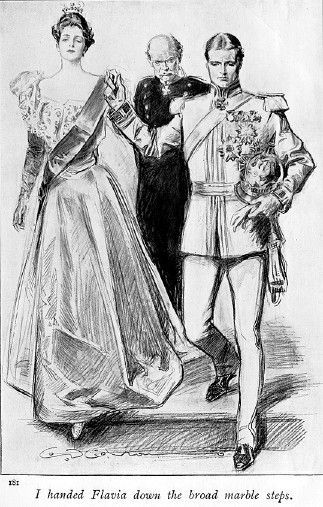
Prisoner of Zenda is a novel about a roguish con-man who visits a postage-stamp, charmingly picturesque Central European kingdom with storybook castles, where he finds he looks just like the local king and is forced to pose as him in palace intrigues. It’s a swashbuckling story about mistaken identity, swordfighting, and intrigue, one part swashbuckler and one part dark political thriller.
The popularity of this book predates organized fandom as we know it, so I wonder if “fandom” is even the right word to use. All the same, it inspired fanatical dedication from readers. There was such a popular hunger for it that an entire library could be filled with nothing but rip-offs of Prisoner of Zenda. If you have a favorite writer who was active between 1900-1950, I guarantee he probably wrote at least one Prisoner of Zenda rip-off (which is nearly always the least-read book in his oeuvre). The only novel in the 20th Century that inspired more imitators was Sherlock Holmes. Robert Heinlein and Edmond “Planet Smasher” Hamilton wrote scifi updates of Prisoner of Zenda. Doctor Who lifted the plot wholesale for the Tom Baker era episode, “Androids of Tara,” Futurama did this exact plot too, and even Marvel Comics has its own copy of Ruritania, Doctor Doom’s Kingdom of Latveria. Even as late as the 1980s, every kids’ cartoon did a “Prisoner of Zenda” episode, one of the stock plots alongside “everyone gets hit by a shrink ray” and the Christmas Carol episode.
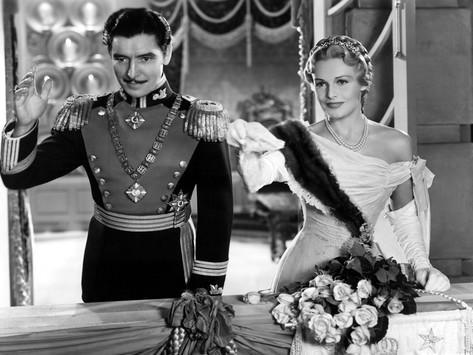
Prisoner of Zenda imitators were so numerous, that they even have their own Library of Congress sub-heading, of “Ruritanian Romance.”
One major reason that Prisoner of Zenda fandom died off is that, between World War I and World War II, there was a brutal lack of sympathy for anything that seemed slightly German, and it seems the incredibly Central European Prisoner of Zenda was a casualty of this. Far and away, the largest immigrant group in the United States through the entire 19th Century were Germans, who were more numerous than Irish or Italians. There were entire cities in the Midwest that were two-thirds German-born or German-descent, who met in Biergartens and German community centers that now no longer exist.
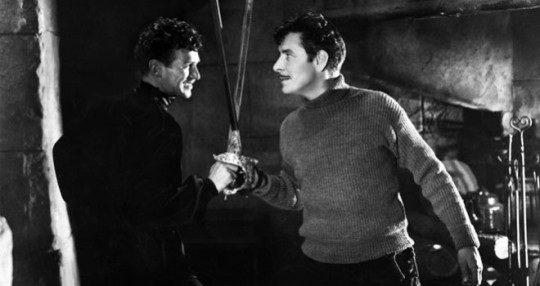
Kurt Vonnegut wrote a lot about how the German-American world he grew up in vanished because of the prejudice of the World Wars, and that disappearance was so extensive that it was retroactive, like someone did a DC comic-style continuity reboot where it all never happened: Germans, despite being the largest immigrant group in US history, are left out of the immigrant story. The “Little Bohemias” and “Little Berlins” that were once everywhere no longer exist. There is no holiday dedicated to people of German ancestry in the US, the way the Irish have St. Patrick’s Day or Italians have Columbus Day (there is Von Steuben’s Day, dedicated to a general who fought with George Washington, but it’s a strictly Midwest thing most people outside the region have never heard of, like Sweetest Day). If you’re reading this and you’re an academic, and you’re not sure what to do your dissertation on, try writing about the German-American immigrant world of the 19th and 20th Centuries, because it’s a criminally under-researched topic.
A. Merritt
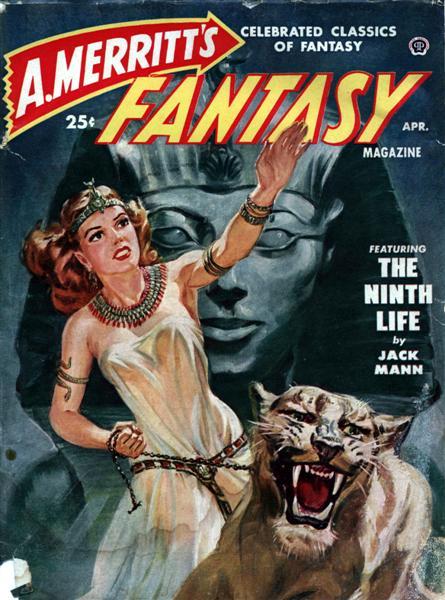
Pop quiz: who was the most popular and influential fantasy author during the 1930s and 40s?
If you answered Tolkien or Robert E. Howard, you’re wrong - it was actually Abraham Merritt. He was the most popular writer of his age of the kind of fiction he did, and he’s since been mostly forgotten. Gary Gygax, creator of Dungeons and Dragons, has said that A. Merritt was his favorite fantasy and horror novelist.
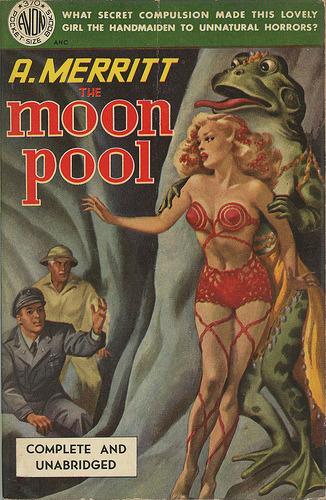
Why did A. Merritt and his fandom go away, when at one point, he was THE fantasy author? Well, obviously one big answer was the 1960s counterculture, which brought different writers like Tolkien and Lovecraft to the forefront (by modern standards Lovecraft isn’t a fantasy author, but he was produced by the same early century genre-fluid effluvium that produced Merritt and the rest). The other answer is that A. Merritt was so totally a product of the weird occult speculation of his age that it’s hard to even imagine him clicking with audiences in other eras. His work is based on fringe weirdness that appealed to early 20th Century spiritualism and made sense at the time: reincarnation, racial memory, an obsession with lost race stories and the stone age, and weirdness like the 1920s belief that the Polar Arctic is the ancestral home of the Caucasian race. In other words, it’s impossible to explain Merritt without a ton of sentences that start with “well, people in the 1920s thought that...” That’s not a good sign when it comes to his universality.
That’s it for now. Do you have any suggestions on a dead fandom, or do you keep one of these “dead” fandoms alive in your heart?
3K notes
·
View notes
Text
How Star Trek: Next Generation’s “The Chase” Changed Canon Forever
https://ift.tt/3eRzqpi
What do space heists and archaeology have in common? The answer is one of the most important and bizarrely under-appreciated episodes of Star Trek: The Next Generation: Season 6 banger, “The Chase.” Written by future Battlestar Galactica showrunner Ronald D. Moore and Joe Menosky, and directed by Jonathan Frakes, “The Chase” is a perfect example of a late-era TNG episode insofar as the characters all feel super-cozy, and the story has a subtle intensity without resorting to a ton of explosions or violence. At the same time, “The Chase” also offered a Watsonian answer to a question with a seemingly very obvious Doyle-ist answer: Why do Star Trek aliens look the way they do? In “The Chase,” we learn all about the rules of Trek aliens, and along the way, the TNG lore is expanded in other big ways, too.
“The Chase” aired on April 26, 1993, and as such, exists in the interesting time when TNG and DS9 were airing new episodes simultaneously. DS9 had already expanded the canon of Trek by permanently parking itself in the histories of both the Bajorians and the Cardassians, but in doing so, DS9 had also brought another Star Trek plot element back into vogue in a big way: The ancient space mystery! These kinds of stories usually focus on a long-dead alien species that had a profound impact on history and influenced everyone’s basic perception of why things are the way they are. In a sense, the entire first season of Star Trek: Picard falls into this story phylum. In the 1993 DS9 pilot, “The Emissary” — which aired just six months before “The Chase” — we learn the ancient gods of Bajor, the Prophets, are really timeless aliens from another plane of existence. This kind of idea is nearly as old as science fiction itself, but prior to DS9, Star Trek did this all the time. The notion of ancient and influentially alien races pops up in TOS a lot, including references to “the Old Ones,” in “What Are Little Girls Made Of?” and “Catspaw.” There’s also Sargon’s race of energy beings from “Return to Tomorrow,” who low-key take credit for the existence of humanoids. This idea also pops up with “the Preservers” in the episode “The Paradise Syndrome.” Before “The Chase,” TNG had a few episodes like this, too, including “The Last Outpost,” and pivotally, the Season 2 episode “Contagion,” the first time we learn that Picard had previously considered a career in archeology before staying on the career path that led to starship captain.
The notion that Picard has an Indiana Jones-esque tendency embedded in his personality is one of the smarter layers in his character. I love Kirk, but, other than horseback riding and mountain climbing, his hobbies are comparatively kind of generic throughout TOS and the films. (Sulu has more unique hobbies!) One of the reasons the character of Picard is so easy for people to embrace is his multifaceted love of all sorts of stuff that doesn’t have much to do with exploring space. In “The Chase,” we get a character-development metaphor that illustrates this is the ancient artifact called the Kurlan naiskos, a statue with little statues inside of it, representing as Picard says, “the many voices inside the one.” The storytelling lesson? Cool characters work better when there’s contradictory stuff inside of them.
It’s also helpful when those “many voices” can create cool stories. In High Fidelity, John Cusak’s Rob Gordon explains character development like this: “What really matters is what you like, not what you are like… Books, records, films – these things matter!” With Picard, the vastly different interests that feel divergent from his Starfleet persona — hard-boiled noir novels, archaeology — help round him out in a way that you can imagine him as a real person, existing beyond the confines of the TV show. But, prior to “The Chase,” the archaeology thing hadn’t really been explored in any real way. It’s almost like in the final two seasons of TNG, the writers remembered Picard has a cool intellectual superpower called “archaeology.”
After “The Chase,” we get a Season 7 two-parter called “Gambit,” in which Picard goes undercover using his former archeology professor’s name, Galen, to track down—you guessed it—ancient pieces of an alien artifact that could have untold power! The interstellar adventures of Galen Jones never really took off as a TNG spin-off, but again, if you squint, aspects of Star Trek: Picard don’t feel that far off from “The Chase” or “Gambit.” (As post-” Unification” stories, these episodes also double-down on the idea that Picard is personally invested in the history of Romulus and also making peace with the Romulans in general. Thanks, Spock!)
But. The reason why “The Chase” is so important to Star Trek canon isn’t just connected to the ongoing character development of Jean-Luc Picard. Picard’s personal stakes in unlocking an ancient archeology mystery help make the episode move, but the larger revelation of what is going on is slightly cooler. There’s a scene where Picard is describing the four billion-year-old genetic mystery and the camera slowly zooms in on him, really letting you know that this shit is about to get real. It goes like this:
“It’s four billion years old. A computer program from a highly advanced civilization, and it’s hidden in the very fabric of life itself. [SLOW JONATHAN FRAKES ZOOM LENS BEGINS, OMINIOUSLY.] Whatever information this program contains could be the most profound discovery of our time. Or the most dangerous.”
The culmination of “The Chase” is all about various governments trying to unlock the secrets of the genetic computer program to figure out its secrets. This is the Raiders of the Lost Ark stuff. The Klingons think it’s a giant weapon. The Cardassians think it’s an unlimited power supply. Belloq thinks it’s a radio for talking to God, even though nobody invited him. Even the Romulans are in on it, wanting to obtain this four billion-year-old puzzle for themselves. In the end, the big revelation is that all the “humanoid” bipedal species we’ve seen throughout Star Trek were created intentionally by an even more ancient set of humanoids. This tap-dance with real science doesn’t contradict evolution per se, but in the ancient message the ancient humanoid woman says: “Our scientists seeded the primordial oceans of many worlds, where life was in its infancy. The seed codes directed your evolution toward a physical form resembling ours.”
Read more
TV
Star Trek Villains Who Actually Had a Point
By Ryan Britt
TV
Why Star Trek Needs More Characters Like Captain Lorca
By Lacy Baugher
So, the TLDR is that in the Trek universe, we evolved naturally, but only because we were given a push. This is as close the Trek canon will come to the notion of panspermia, the real-life theory that organic life could have been intentionally seeded on Earth. But, Trek alum Ronald D. Moore would revisit this idea in a big way in his famous reboot of Battlestar Galactica. This has all happened before and it will all happen again… sometimes, in a different franchise.
So what’s the big deal with the revelation that all the humanoid alien species share a common ancestor? Well, the knee-jerk answer is that this episode provided bandaid on the slightly unrealistic notion that most aliens in Star Trek just like humans with different foreheads or wrinkled noses or funny ears. And that’s true, “The Chase” does provide a Watsonian answer for why the Star Trek universe looks the way it does, at least when it comes to extraterrestrials. Haters might say this was a bad idea because it called attention to something that doesn’t need explaining, sort of like the Trek version of the midichlorians. But, that negative take misses a slightly larger truth, which debunks an important myth about the foundation of Trek.
The reason why The Original Series mostly tackled aliens who looked like humans in bad make-up is only partially an economic one. Yes, it’s widely impractical to do Hortas and Gorns every week, but in creating the writers’ bible for TOS, Roddenberry also made it clear that humanoid aliens were part of a dramatic choice, not just an economic one. In early pitch documents, Roddenberry describes “the parallel worlds” concept like this: “It means simply that our stories will plant and animals life, plus people, quite similar to that on Earth.”
Roddenberry wasn’t just doing this to save money. The “parallel worlds” concept was clearly something he wanted so the stories would connect with a casual viewer and not just hardcore science fiction fans. Prior to Star Trek, the general perception of filmed science fiction was that it was genre dominated by “Bug-Eyed Monsters.” By introducing the “Parallel worlds” concept, Roddenberry was creating a buffer against the series becoming too much like monster-of-the-week science fiction. Yes, this decision conveniently saved a little bit of money, but it’s very clear that wasn’t the only factor. Even at the beginning, Star Trek wanted to do humanoid aliens not because it was easy, but because telling those stories would be more interesting.
cnx.cmd.push(function() { cnx({ playerId: "106e33c0-3911-473c-b599-b1426db57530", }).render("0270c398a82f44f49c23c16122516796"); });
What Moore and Menosky did with “The Chase,” was to come right out and make that dramatic choice into a thoughtful and exciting episode. The physics and biological science of the Star Trek universe might not exactly line up with our own, but the way in which the various shows prioritize people over technology is a relative constant. In “The Chase,” TNG reminded everyone that Star Trek was always about telling stories about people, even if those people were literally aliens. In this way, “The Chase” didn’t so much as change canon, but rather, clarified it. The reason why the Romulans, Humans, Cardassians look the way they do has an answer. But the real answer to that question requires even more introspection than the episode has time for. Which, in a nutshell, is what a lot of good Trek is supposed to do. “The Chase” is both an overt metaphor and a hardcore in-universe story at the same time. Many voices, inside the one.
Editor’s note: Norman Lloyd, the actor who played Professor Galen in “The Chase” (and inhabited many, many other roles in his long career) passed away earlier this week. You can learn more about his life and career here.
The post How Star Trek: Next Generation’s “The Chase” Changed Canon Forever appeared first on Den of Geek.
from Den of Geek https://ift.tt/3uNsHnc
0 notes
Note
In an earlier podcast I heard that you regard Star Trek as the dawn of fandom. My sense is that it goes back significantly further, for example WorldCons started back in the '40s. Those were fannish communities that obsessed over works, argued over details, sang songs & added to a discussion that is now sprawled all over the internet. WorldCons are also where the Hugos get voted in. Would y'all like to talk to someone deep in that space? Tom Whitlow knows a lot; I can put y'all in touch.
Hello! This is @flourish answering your ask. I’m speaking for both of us, but @elizabethminkel might have something to add in about it and I don’t want you to be surprised if she does, so... FYI!So, you might have not listened to all our podcasts yet! We cover this topic not intensively in one, but spread out over many. So it’s probably easy to miss the full scope of our thinking on it... here’s a precis.We definitely talk about Star Trek as the dawn of modern media fandom (NOT fandom as a whole). There’s some argument about this (some people prefer to locate this in The Man From U.N.C.L.E., which was earlier) but we think that Trek really was the first major fanzine focused TV fandom, had the first slash pairing and was the source of the word “slash” - since we typically talk about modern media fandoms as springing out of this kind of fanwork creation, we’re really comfortable talking about Trek this way.Of course, you’re right that there was plenty of fandom before that! You mention WorldCons and science fiction fandom. Old skiffy fans were often pretty hostile to media fandoms like Star Trek, which is one of the reasons we (as a podcast) don’t always consider those things to be overly connected with each other (even though they were definitely related). In other words, we reject the term “fandom” as a way to refer purely to cultures growing out of that WorldCon tradition. That said, I attend Boskone every year; it’s one of the most conservative remaining SFF cons. And I’ve actually done some academic work on tracing SFF fanzines’ roots back through HP Lovecraft’s interest in amateur press associations and earlier in the 1800s to Oliver Optic fandom (though now we realize that I’ve never spoken about this on the podcast!)But that’s not the only way you can trace fandom. If you wanna step slightly to one side, we can talk about Sherlock Holmes fandom - did you listen to one of our first episodes, “Buncha Lawyers”? One of those lawyers is a member of the Adventuresses of Sherlock Holmes, the oldest women’s Sherlockian society! But we can also talk about other types of fannish engagement that’s not locked in to genre fiction (whether mystery or science fiction or adventure). For example, our 10th episode, featuring Evan Hayles Gledhill, was about the Victorian era and the way that young women made sentiment albums that were essentially the same concept as Tumblr, showing their fannishness for a variety of things (not just one genre of fiction). There’s a lot of other examples of this sort we haven’t covered mostly because we haven’t found the right guests to talk about them. (For example, Robert Darnton writes about a bunch of very fannish reactions to Rousseau in the final essay of his book The Great Cat Massacre... that’s just one example that’s easy to find in a currently in-print book!)And that all only covers people responding to the written word in Europe and North America. We could equally be talking about fan cultures in other parts of the world, or we could be talking about celebrity fandoms and the way they’ve evolved over the years, or sports fandoms (the Byzantine Empire has some things to say about that). We definitely consider these things fandom and within our purview, although they aren’t the central focus of what we talk about.In other words: You’re right that Star Trek is not the first fandom of any sort, but we do think it’s an important starting point for modern media fandom, especially in the Anglophone world and in Europe and North America. Hopefully this answer has explained a little more about how we as a podcast think about fandom, why we consider Trek the first modern media fandom, and what some other “first fandom” ideas might be!
30 notes
·
View notes
Text
20 SOME followers I’d like to know better
Tagged by: @sage-fire , somewhere around 182 million years ago (thank you!)
Tagging: Oh hell. Uh. ...............Hey, look, IF YOU WANT TO DO THIS THEN CONSIDER YOURSELF TAGGED AND TAG ME BACK SO I CAN SEE, OKAY?! I suck at the tagging. ...And doing things in a timely manner, but I just remembered it was Monday and I’m trying to be less. ...Absent.
Name/Nickname: Orin, but you may know me as The Angst Fairy, Prince of Angst, or Dirty Old Punk. ...I think there was another angst-related one in there somewhere, but. ..........Welp.
Gender: Whatever/Gender-Meh/Decepticon (seriously, I just... forever shrugging; call me what you like, I won’t be offended and it won’t be wrong)
Height: I still don’t know, okay. Smol but fierce.
Hogwarts House: I don’t know, the uh... t-the cool one..?
Favorite Animal: All of them. Haven’t met any that I really dislike, so.
Hours of Sleep: ...I try for 6, alright.
Dogs or Cats: Both. ...Maybe not in the same body, but that’s a discussion for science.
Number of Blankets: Currently, three. Because I finally found a blanket that works because New England sucks in the winter but not being crushed under layers is nice.
Dream Trip: The Cup Noodle museum in Japan while Chris Parson is also there because I want to see his child-like joy.
Dream Job: To get paid for what I’m already doing more reliably. ...Alternately, stunt driving. ...This becomes funnier when you understand that I do not have a driver’s license for very important reasons. BUT maybe that’s because stunt driving is the better option, right?
Time: 10:00 PM because that’s when I’m finally queuing this.
Birthday: December 22. A long time ago. .........Holy shit that’s in a few weeks.
Favorite Bands: There’s no way in hell I could possibly list all of them. A lot of them. From the origins of rock to random little things I’m thrown now. Rockabilly, do-wop, both UK and New York punk, New Wave, hard rock, glam, hair metal, ‘80s ballad assholes, electronica; I like a lot of things and too many bands. Please do not ask me about my playlists.
Favorite Solo Artist: Gonna steal Atreyu’s answer because... actually they’re mine too, so: Michael Jackson, Prince, David Bowie. ...And also Peter Gabriel. Trent Reznor. The music chaos god Neil Cicierega. ...I get the feeling if I continue I will go on forever, so those folks.
Song stuck In My Head: ...Right now, “The End” by Planet Funk. Give it ten minutes, it’ll be something else.
Last Movie I Watched: ...Indiana Jones and the Last Crusade last weekend. Again. Because bitches love Indy.
Last Show I watched: Crap, uh. ......Um. TV. It was... recent. ............I think Modern Family..? Can you tell how often or how much attention I pay to TV?
When did I create my Blog: Back in March. ...What can I say, I gave in.
What do I post/Reblog: Right now nothing, but when I’m not swamped with every other thing going on, RPs, drabbles, excruciatingly painful gif sets, and mostly polyship roadtrip support. I mean, I gotta.
Last thing I Googled: ...the lyrics to “Wild Bird Flock to Me” (Peter Murphy) because I didn’t want to interrupt what was already playing to listen to one specific part.
Why I chose My URL: ...I mean. (No, I don’t honestly think Noctis is, or ever was, a brat. But I will always call him that, because it amuses me. ...Writing smut, though? 100000000% brat.)
Original intent: RP blog for my very, very loud brat. And sometimes drabble dump. I mean I’m mostly successful when I’m not buried under exhausting offline things, so... score?
Other Blogs: Other active RP blogs: @stonecoldmeme (Prompto), @calamitysshatteredson (Sephiroth); art blog: @shinythingsbyorindrake ; personal blog can be found with digging
Following: 109
Followers: 148 (how... even)
Lucky number: 13
Favorite Instrument: Guitar, probably. I’m biased because that’s what I play. ...But drums are fun too.
What am I wearing: ..................Fuzzy zebra pants and a Garfield shirt. .........Don’t judge me. ...Fuzzy blue socks, too. I like to be warm.
Nationality: So recently my father delved into his side of the family’s history and discovered that while he’d been told his entire life that they were Irish, they were actually Scottish, and it hasn’t stopped amusing me since. Alternately my mother’s side of the family is, I quote, “mostly French, I guess”, which amuses me for another reason. I don’t know, I’m just pale as fuck man.
Favorite Song: I could never choose one. I couldn’t choose ten, apparently.
Last Book I Read: Re-reading It by Stephen King. Well, I was. I tend to read when I travel and... not as much when I don’t. If you don’t count fan fiction.
Top Three Fictional Universes I’d Like to Join: I’m going to get stared at so hard if I say FFXV but. Like. ..........Bad shit’s happening and everything is on fire, but at least it feels like there’s some hop eon Eos. *cough* Uh... Star Trek. ...Pre-reboot stuff. I’m old, kids. That said, Next Generation and Voyager were my jam so. Medium-old. And finally... uh... Tron. Because I am a giant nerd and Tron: Legacy is my aesthetic. Also jfc will someone please send a fucking light submarine out and HELP MY BOY. But in the end Disney brought the franchise back just to brutally murder it in front of everyone so I get to be bitter for the rest of my life.
2 notes
·
View notes
Text
FANFICTION SPEECH FEEDBACK
Hi! I’ve written a speech about fanfiction for my collegiate forensics event this year. I would appreciate any feedback that the community could provide on my portrayal of fanfiction and how i am communicating it to audiences with little/no knowledge of fanfiction. If you could share this that would help as well. Thanks in advance!!
THE SPEECH IS AS FOLLOWS:
Rose Christio was separated from her younger brother in New York’s foster care system in the early 2000s. But time and time again, the system failed her, she was unable to find any trace of him. For help she turned to an unconventional place: the online community of Fanfiction. What resulted, was a 44 chapter typo-filled, hyperbole laden Harry Potter fanfic dubbed “the worst fanfiction ever.” but has become one of the most infamous fanfictions to grace the internet: My Immortal. Fanfiction has been pushed to the back corners of the internet and viewed simply as poorly written pornography; when in reality, it’s home to marginalized communities and transformative fiction and some poorly written porn.
Because an anonymous young woman was flamed online for over a decade about her fanwork with no real attempt to understand it, Christio’s forthcoming memoir from MacMillan publishing, encourages us to dive into the inner workings of fanfiction.
We will take an in-depth look at what fanfiction is, how fanfiction communities function, and limitations behind communicating about fanfiction.
While Christio’s memoir won’t be published until May 29, 2018, we have the chance to be ready to accept it as we weren’t ready to accept My Immortal a decade ago
Fanfiction, noun: fiction written by a fan rather than a professional author, esp. that based on already-existing characters from a television series, book, film. Often abbreviated to fanfic
Consider this your fanfiction orientation as we look first at fanfiction history and second at the transformative nature of fanfiction.
Fanfiction has existed as long as literature. Let's be real Virgil’s Aeneid is complete fanfiction for Homer’s Illiad and Odyssey. According to the 2013 book Fic: Why Fanfiction is Taking Over The World, J.M. Barrie, the author of Peter Pan, wrote Sherlock Holmes fanfiction. What we consider modern fanfiction got its start in the 60s with Star Trek. Because who wouldn’t want to write about Kirk and Spock boning, Nuff said.
Second, the Transformative nature of fanfiction hinges around canon divergence. Canon, noun: the basic premise of the work from which a fanfic is derived. Anything that strays from the information set forth is considered to be canon-divergence. Canon divergence can consist of changing the sexual or gender orientation of characters, or writing specific sexualities for secondary-characters whose sexuality is unknown in the canon. One example of character divergence comes in the Harry Potter fanfiction “Of Leaves and Stars,” Remus Lupin is written as a transgender character.
Canon divergence also comes through Alternate Universes. Alternate Universe, noun: a descriptor applied to fanfiction which alters the setting or plot of a story. For example, the classic coffee shop AU takes the characters of a story and places them into a coffee shop scenario. The AU solidifies fanfiction as character driven fiction. Tumblr user soldierjhwatson explains “I’ll read the same character in a hundred different ships, in all of the different fic genres and tropes, AUs or what have you, because I like to see how they adapt to those changes.” Fanfiction provides a opportunity to play with familiar texts in a unique way.
Now that you’ve gotten a crash course in fanfic, the texts alone don't describe how powerful fanfic can be, understanding the people who are responsible for the texts is crucial.
Fanfiction communities are composed of marginalized communities who have found a place to create their own stories. Librarian of Congress Dr. Carla Hayden said in a 2017 interview with TIME, “Books can be mirrors and windows” and results of a 2013 survey of the users of popular fanfiction site Archive of Our Own, shows that fanfiction achieves the same effect. The survey provides specific breakdowns but to put it simply a majority of fanfiction users are non-straight women. In fact, more genderqueer individuals interact with fanfiction than men. The diversity of these communities makes their fiction more diverse as well.
Because the fanfiction community exists on the margins, fanfiction is often a personal experience. Unfortunately, the misconception exists that fanfiction writers are simply in search of publishing deals. Forbes sums it up with just the title their February 10, 2017 article “Fifty Shades Of Green: How Fanfiction Went From Dirty Little Secret To Money Machine.” Contrary to that belief fanfiction writers write for personal reasons, or for others within the community. Archive of our own lists 438 tags that are all some form of authors projecting onto fictional characters. Fanfiction writers also write for others within the community by filling prompts, writing birthday fictions, or participating in Christmas secret santa exchanges. The goal of fanfiction is not to achieve traditional publishing, instead it becomes cathartic.
Here are a couple of questions you might have as we move into our final point: 1) why are we not approaching fanfiction through a critical lens? And 2) Where the hell are the sources? We will be addressing the limitation of communication about fanfiction by answering these 2 questions.
First: Why are we not approaching fanfiction through a critical lens? I’ll admit, that was my goal at the beginning, because the critical conversation surrounding fanfiction right now is hopping. Francesca Coppa, an English professor at Muhlenberg university recently published The Fanfiction Reader, designed to be a textbook for courses covering fanfiction, a copyright case featuring a Star Trek fanfiction just closed this January, and a recent piece from the New York Times looked into the implications of RPF. RPF, noun: abbreviation of Real Person fic; fanfiction written about real people. These critical conversations cannot happen without base level knowledge of fanfiction, which you've just acquired. It is imperative this knowledge be gained, so future speeches can be given about the critical conversation surrounding fanfiction. This is simply the start, to a larger conversation.
Second: sources? I do have a couple of what are considered to be "canon" sources, but for the most part; I am the source. As a member of the fanfiction community, I contain the knowledge of the niche vocabulary and practices of the community. In my previous subpoint I just solidified that there are sources available about fanfiction, but the sources I need to teach you about fanfiction are non-existent. So, to validate my information, since all sources do is provide validity, I’ve posted the text of this speech on fanfiction forums and other popular fan websites to garner feedback from the very communities I’m discussing I then am editing my speech as that feedback is received to properly represent fanfiction, thus providing my speech with credibility, because I, like the fanfiction community I read within, understand that credibility on the margins is different than it is IRL. IRL, abbreviation: In Real Life.
I read more fanfiction than I do actual fiction, and I read a lot of real fiction. You don’t have to be like me, but you can at least take the base understanding of fanfiction, fanfiction communities, and the limitations of communicating about fanfiction and begin to understand these transformative works. If you want to find a place to start reading fanfiction, check out The Rec Center newsletter or ask your local nerd, hint that’s me, for recommendations. If you can accept this fanfiction of a speech, then you can accept Christio’s May 2018 memoir, and maybe even accept the fanfiction My Immortal.
#fanfic#fanfiction#fandom#fan community#writing#speech#forensics#help wanted#fanfiction writing#fanfic writing
3 notes
·
View notes
Text
tagged by @emberists
rules: tag any followers you want to get to know better
name: Althea
nickname(s): Well... I mean, being completely honest, Althea is an alias.
zodiac sign: Pisces. Yes, that’s probably why I’m like that.
hogwarts house: I’ve never really been that into Harry Potter (yes yes, just stone me already) but I’ve taken the Pottermore like three times and I’ve gotten Slytherin twice and Ravenclaw once so... take that as you will.
height: 5′3″. I’m short -_-
sexual orientation: Pansexual is the best word to describe it probably.
ethnicity: White, more specifically Italian American though.
favorite fruit: Do avacados count?
favorite season: Winter. Straight up it could snow 100% of the time and I would be happy.
favorite book series: I???. Honestly since high school I’ve only read stuff on mythology and fanfiction. Idk.
favorite fictional character: Would it be too generic to say Spock from Star Trek: The Original Series?
favorite scents: Anything that smells of wood? Pine, cedar, etc. Also lavendar and sage are nice.
favorite color: Grey, black or red probably.
favorite animals: Uhh... dogs are the best, most birds, birds of prey and corvids in particular, small cute bugs (such as grasshoppers) except for spiders. Spiders and I don’t vibe. Snakes are very aesthetically pleasing but I’m highkey very scared of them.
favorite band/artists: I’m kinda into literally every type of music, even the “trashy” stuff, but these are some bands/artists that I listen to a lot: The Kooks, Depeche Mode, Glass Animals, Bryson Tiller, The Neighbourhood, First Aid Kit.
coffee, tea, or hot chocolate: Considering the fact that caffeine makes me suuuuper anxious, I’m gonna say herbal tea.
average hours of sleep: 4-7, usually during the day. But sometimes I’ll sleep like, three hours here, and four or five more like six hours later. It’s called biphasic sleeping and the only reason I know about this is because I’m way too curious for my own good and I have the sleeping habits of a paranoid bat.
number of blankets: Just one, with the fan on. Can’t stand the extra weight.
dream trip: Really long tour of South America.
last thing i googled: "word count Harry Potter books”. For science, of course.
how many blogs i follow: 739
number of followers: 127, but about 27 of those are really recent followers. Where did y’all come from?
what i usually post about: Heathenry, Lokean stuff, things I find aesthetically pleasing... I think that about sums it up.
do you get asks regularly: Not very often, but then again I think this is because I’m kinda withdrawn (as opposed to outgoing).
Tagging: @anastasiaoftheironwood, @lokishelm, @myrtlemorgraine, @justaseasaltyselkie, @jordfast-lokispouse.
4 notes
·
View notes
Text
I was tagged by @tiny-teapot-stuck-in-a-burrow AND @aconitum-napellus !! Thank you both!!!!!! I added both your new question. Sorry if I write too much.....
rules: answer all questions, add one question of your own and tag as many people as there are questions.
1. coke or pepsi: Coke, though I really don’t drink colas much. When I do drink sodas I prefer a root beer or ginger ale/beer.
2. disney or dreamworks: Disney I guess, considering their entire body of work and owning Pixar.
3. coffee or tea: I drink more coffee but prefer tea. Go figure! LOL
4. books or movies: No, don’t make me choose!!!! Technically I prefer books, but I get so little time to read anymore. Movies are much quicker to take in. Actually, both are art, just different kinds, and it depends what medium best suits the individual story.
5. windows or mac: windows, sort of.
6. dc or marvel: In comics-DC, not that I read many superhero ones anymore. And if you count my entire life, when I adored the mutants, Marvel. In movies- Marvel
7. x-box or playstation: neither, I don’t have the money for gaming
8. dragon age or mass effect: Dunno. Back when I used to visit my brother I got to play both a bit, but mostly I was stuck watching him play the, NOTHING is more boring than watching someone else play a game! LOL I can’t remember having a preference.
9. night owl or early riser: Night owl!! Early mornings make me feel ill. Seriously!
10. cards or chess: I LOVED playing chess but I had no one to play with (parents had no time and my brother wouldn’t play things he lost! LOL) So, cards. At least you can build a house of cards or play solitaire with them!
11. chocolate or vanilla: for candy- chocolate, for milk shakes- vanilla, for ice cream- anything else
12. vans or converse: Neither. Since my feet and ankles are so messed up, I long ago gave up worrying about shoe fashion. If it is big enough for my giant feet and ankle brace, and it supports my bad ankles, I get it no matter how hideous. That’s harder than you think....
13. Lavellan, Trevelyan, Cadash, or Adaar: I think this is a gaming thing I’m not qualified to answer.
14. fluff or angst: Both! Gotta keep a balanced fictional diet. Really, I just want to put characters through the wringer AND have them happy, so mixing the two in one story is a thing I do. Not that any of you have read any of my stories! LOL
15. beach or forest: Both!!!!!! I grew up spending my weekends at the beach and a lot of the rest of the time in woods, so it’s too hard to choose.
16. dogs or cats: BOTH! I wouldn’t want to offend half the non human part of my family by picking favorites!
17. clear skies or rain: Rain, with a special fondness for hurricanes (before the boat respinsiblities got so overwhelming). Besides, I burn too easily in the sun.
18. cooking or eating out: Take out from some really good place, so I don’t have to eat in public or do as many dishes. I REALLY hate washing dishes! Though cooking is nice when I have a nice recipe to work with...
19. spicy food or mild food: Mildly spicy. The sort of level where those that like spicy mock you for being a wimp and those that like mild (looking at you Mom) find your cooking too strong.
20. halloween/samhain or solstice/yule/christmas: ACK! BOTH! Those are my favorite times of year, or at least they were until last year got so melencholy at Christmas.
21. would you rather forever be a little too cold or a little too hot: Cold. I have lived both (thank you lack of heating and unreliable air conditioner). Cold you can just wear more, bundle up, and even get down right cozy for sleeping that way. But hot is miserable and keeps you from sleeping. Plus, I’m unfortunately someone that sweats easily, and society really, really hates that.
22. if you could have a superpower, what would it be: Immortality! Life is far, far too short to see and do even a fraction of the things I want. Heck, I won’t even live ling enough to read all the books I own! Plus you get the facinating chance to watch the world change, to get to see things playout, and gain the perspective to know that impermanence of it all...well, except for you.
23. animation or live action: Animation. It allows so much freedom of apperance, so many individual styles, embracing the surreal, strange and dreamlike on a regular basis.
24. paragon or renegade: depends on what this is refering to. I have seen it used in a game somewhere, so in that case I don’t have an opinion. As a general term, renegade.
25. baths or showers: Shower, though not based on preference so much as neccesity. When I was tiny they cut a notch out of the bathtub here so my grandmother could step into it, but the patch Pop put in after she died has broken loose. So, more than a couple inches of water you flood the floor!
26. team cap or team iron man: Cap
27. fantasy or sci-fi: BOTH! Sometimes the line between the two is very thin anyway.
28. do you have three or four favourite quotes, if so what are they: Not really. I find them interesting but never memorize them. I horrified my teachers when I refused the quote book for my graduation speech. I like what others say, but I prefer to speak for myself. Now if you wanted me to recite Jabberwocky or favorite dialog I have memorized.....
29. youtube or netflix: youtube I have a poor internet connection and no money, so netflix is out.
30. harry potter or percy jackson: Harry Potter, though since I haven’t read any Percy Jackson or seen the movie, maybe I should abstain.
31. when you feel accomplished: When I get to the end of the day and I have something completed, like a bit of sculpting, but this is usually immediately followed by absolute dissatisfaction with the results and questioning whether I should have done something else instead!
32. star wars or star trek: Aww, now you are talking about my childhood. I suppose it depends on what section of these universes. Both have areas I hate (see everthing about the SW prequels or that smug lot in the Next Gen and my desire to take a lead pipe to Kirk) and aspects I have just skipped. The orginal Star Wars trilogy has a special place in my heart, but don’t tell my beloved Spock!
33. paperback books or hardback books: Hardback, which might be one of the reasons my floor first collapsed under one of my bookcases! LOL
34. fantastic beasts or cursed child: No opinion. I haven’t seen the first or read the second.
35. evans, pratt, hemsworth, or pine: Um, Chris Evans as in the guy playing Captain America. Maybe? I mean, it depends on what part they are playing since I don’t know anything about the actors as people.
36. tangled, frozen, or moana: I don’t know. I liked Tangled, I was generally underwhelmed by Frozen but loved the redefinition of true love to not be romantic, but I haven’t had a chance to see Moana yet.
37. opera or ballet: depends on my mood, but generally ballet. Maybe. At least then the language barrier doesn’t get in the way of comprehension.
38. perfume or incense: Perfume. My fragile lungs hate smoke, even nice smelling stuff.
39. Voldemort or Sauron: Sauron He feels more like a force of nature, rather than someone that keeps having his evil plans messed with by a bunch of a kids.
New question: Would you rather time travel to the past or future?
I cannot possibly tag 39 people!!!
Most of you will not want to do this, so don’t. It REALLY is ok!
I’ll tag some of you, but please do NOT feel you have to do it!!!!!!!!!!!!!!!
@omegadalek @theramblingrogue @whitexblackrose @orcface @takethekeyandlockherup @kimikokat @awesome-beatles-fan @antonnightwatch @arsenalofmerit @aigooylgaifyllina @jamisings @kleurenblind @pupsik11 @runningbarefootthroughtheforest @camerawakened @woodsong @nakila-rimmer-bear @aeqvat-omnes-cinis @imagetornwing @invisibleme59 @javiroa226 @dendroica @lzbarnabas @eleonoraalva
Anyone that wants to do it just pretend I tagged you!
(I am going to lie awake worrying I offended some of you by tagging. )
9 notes
·
View notes